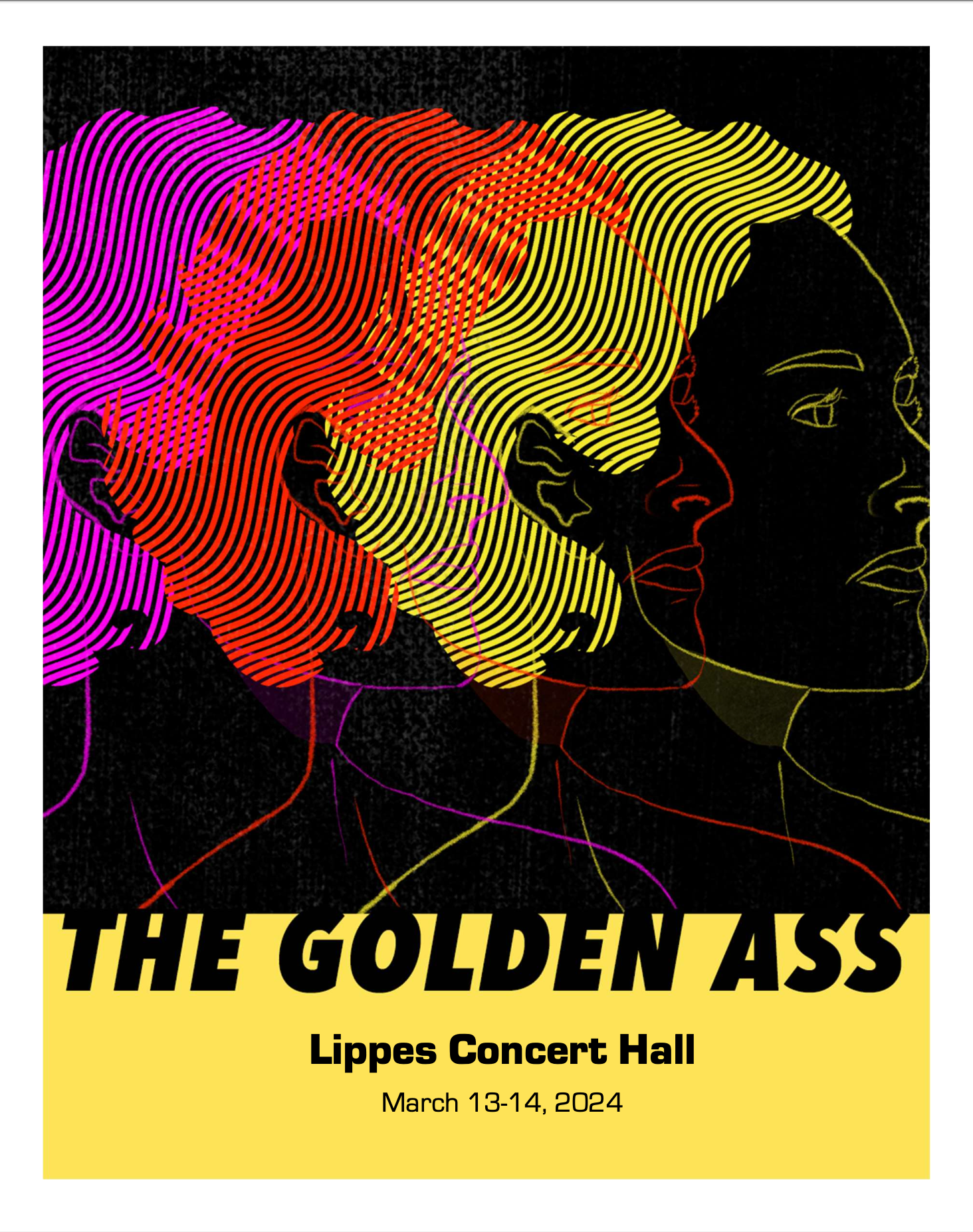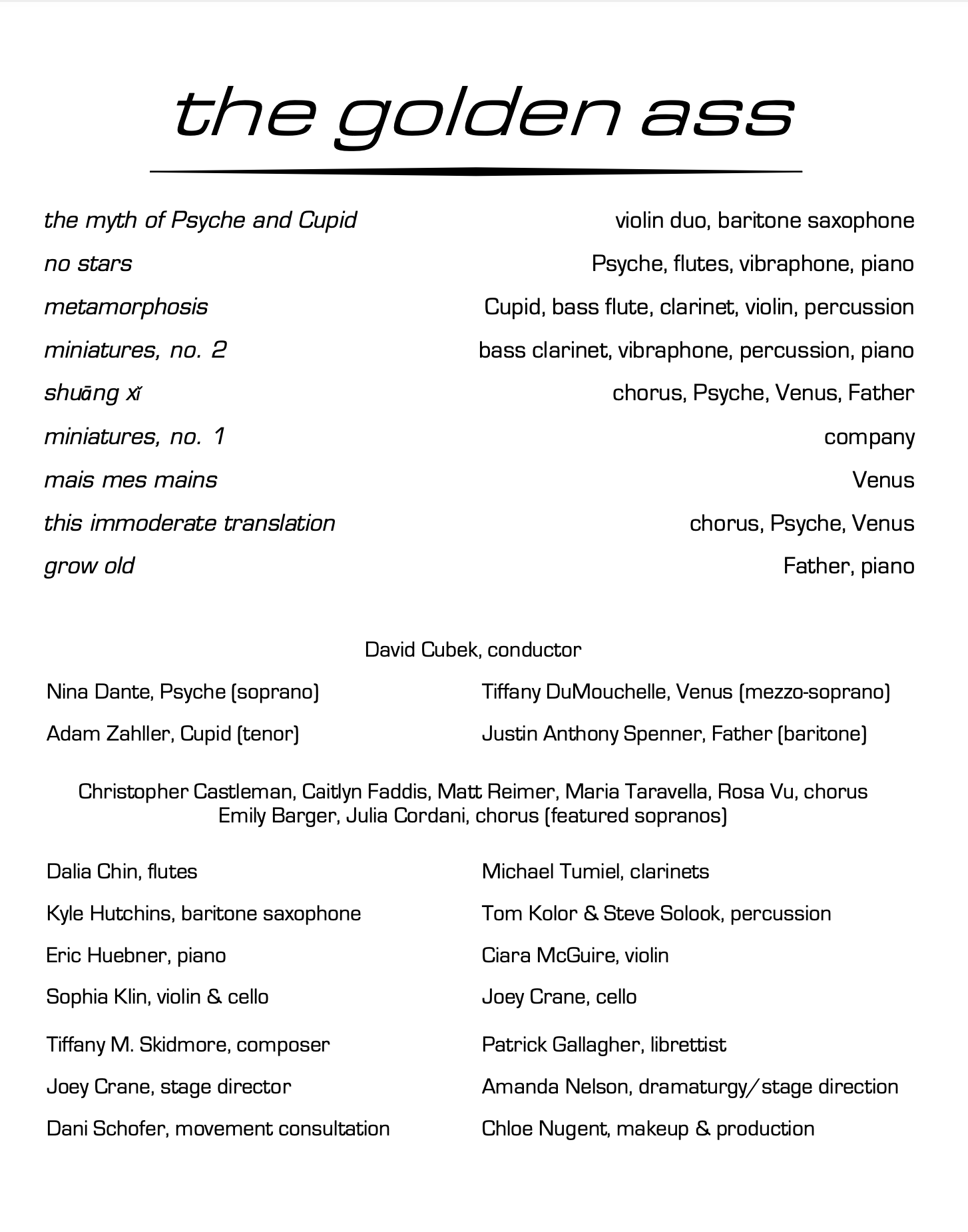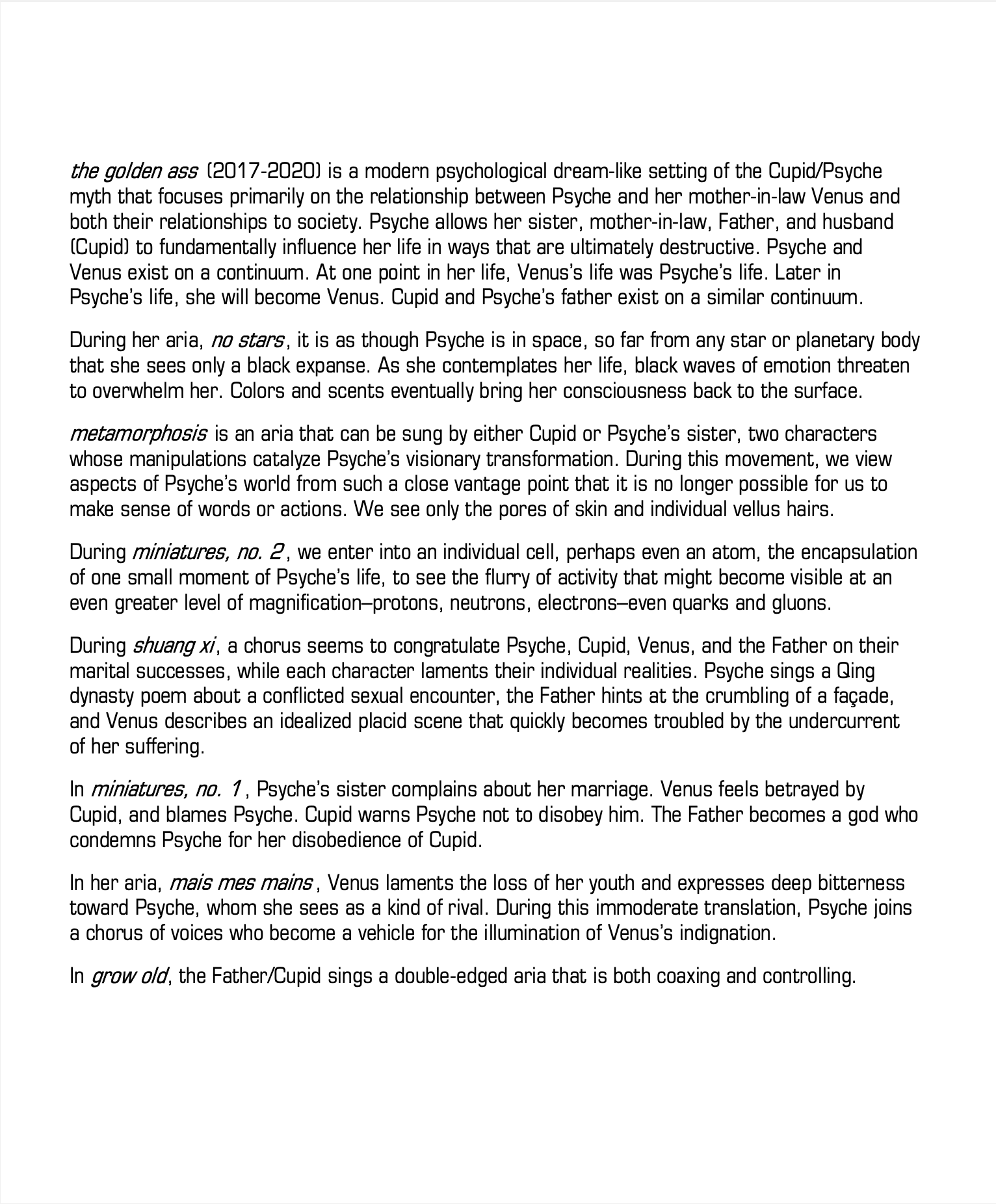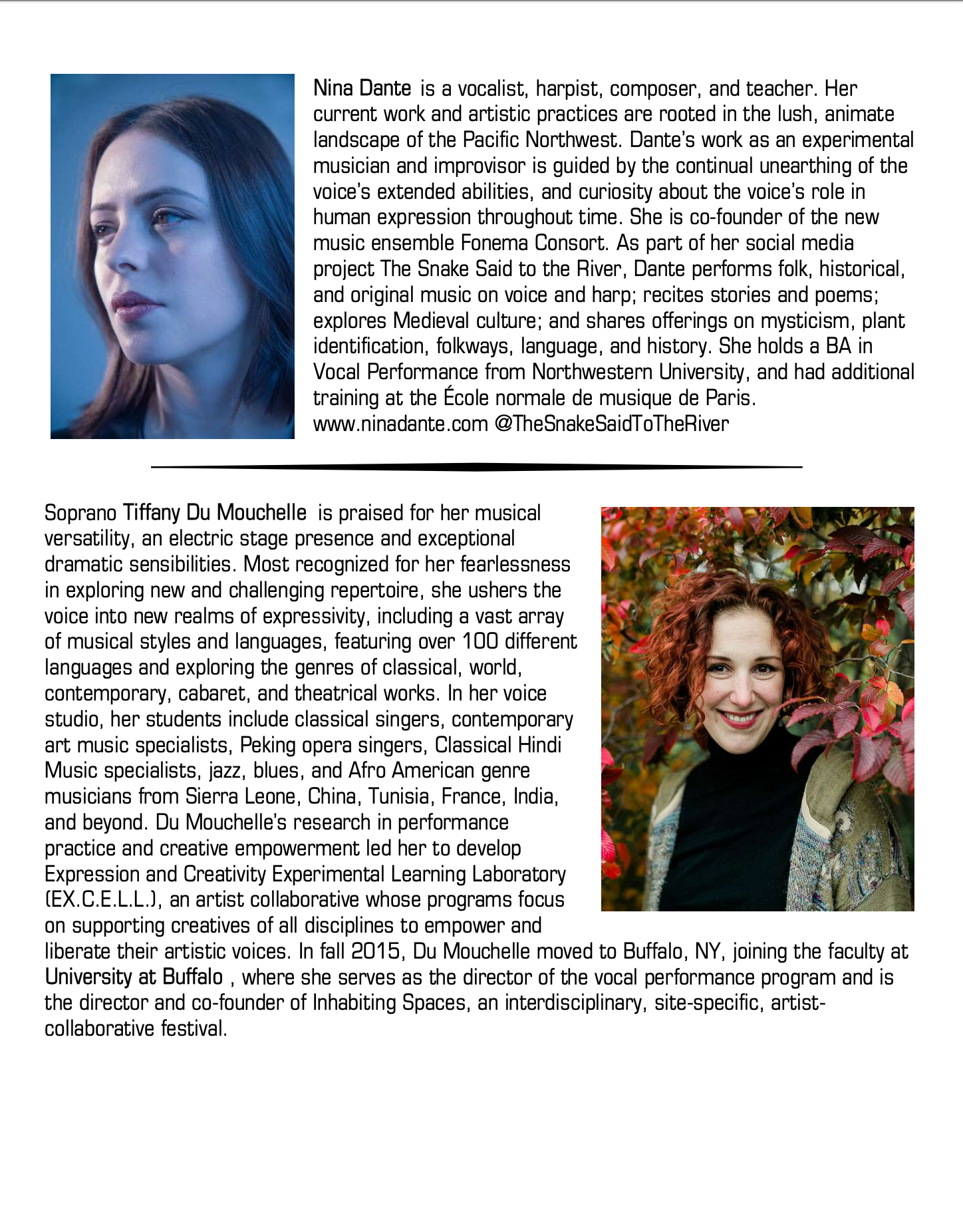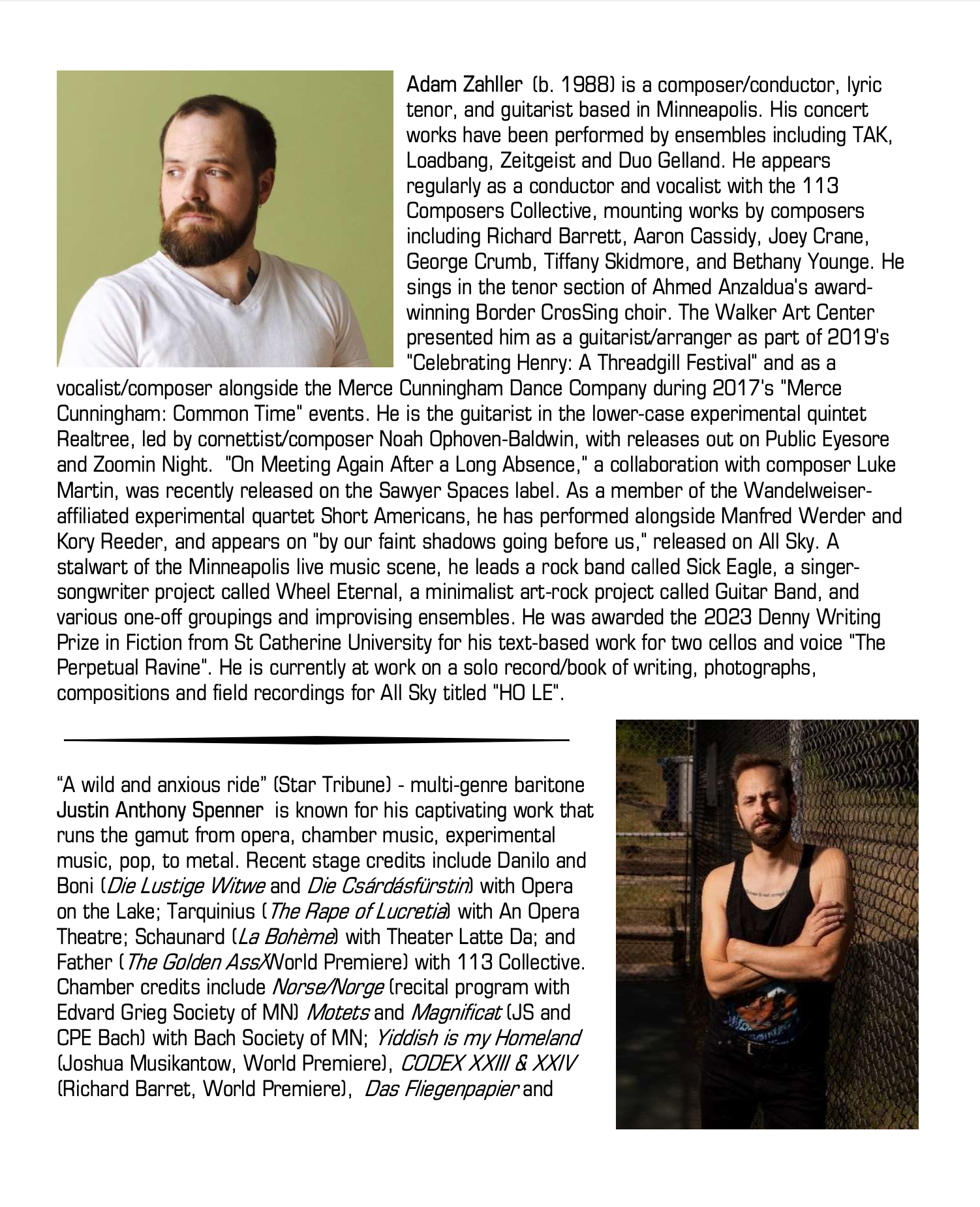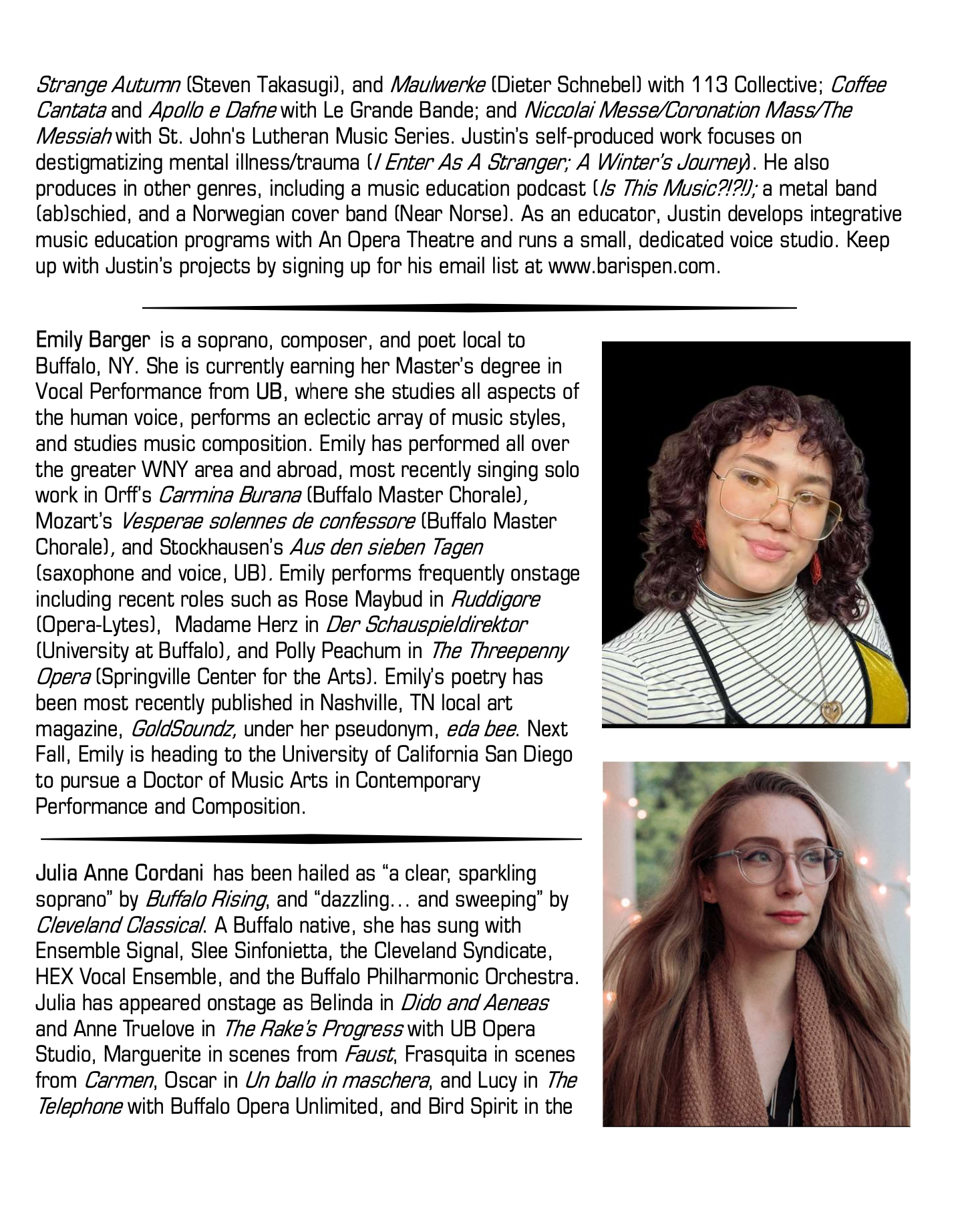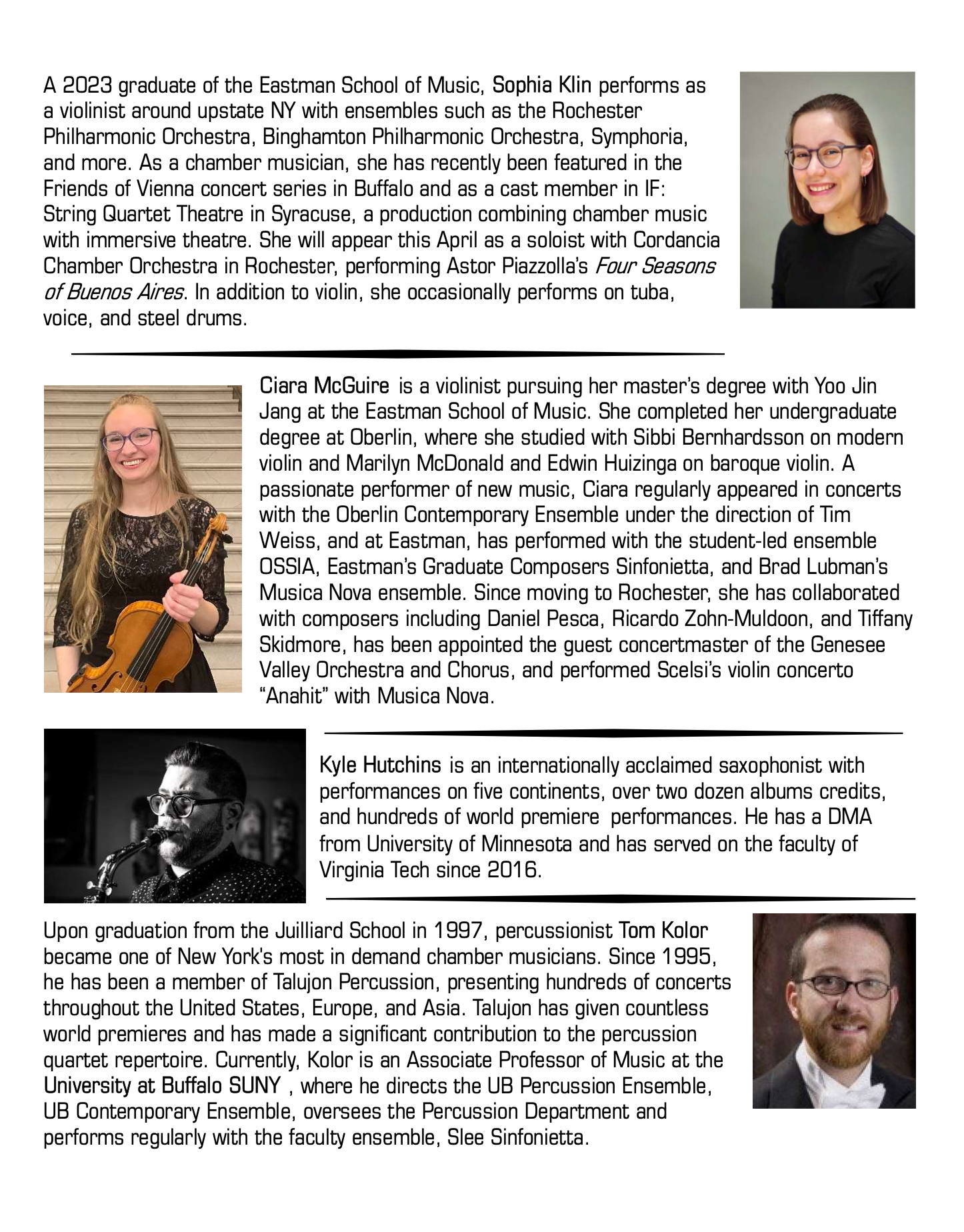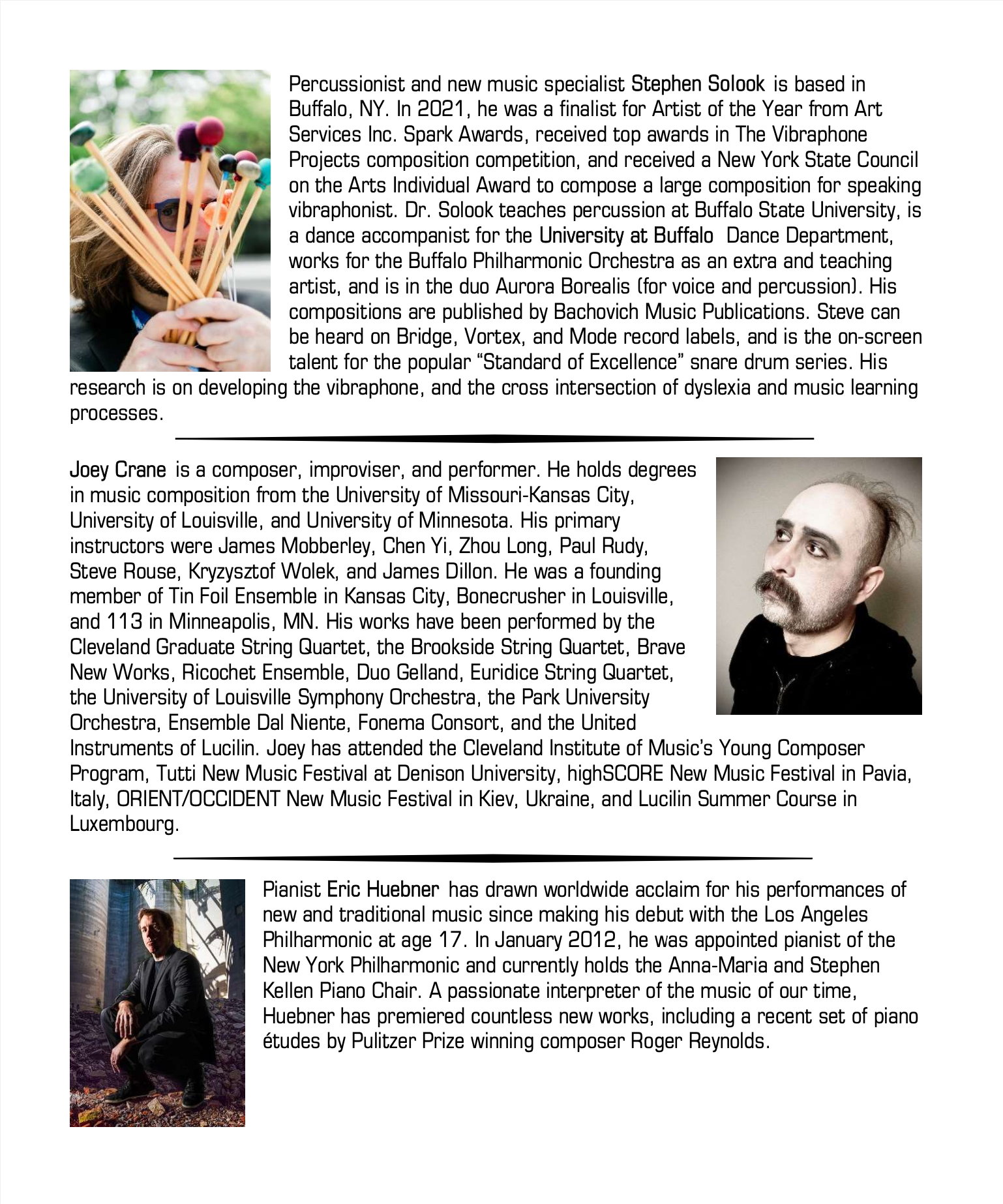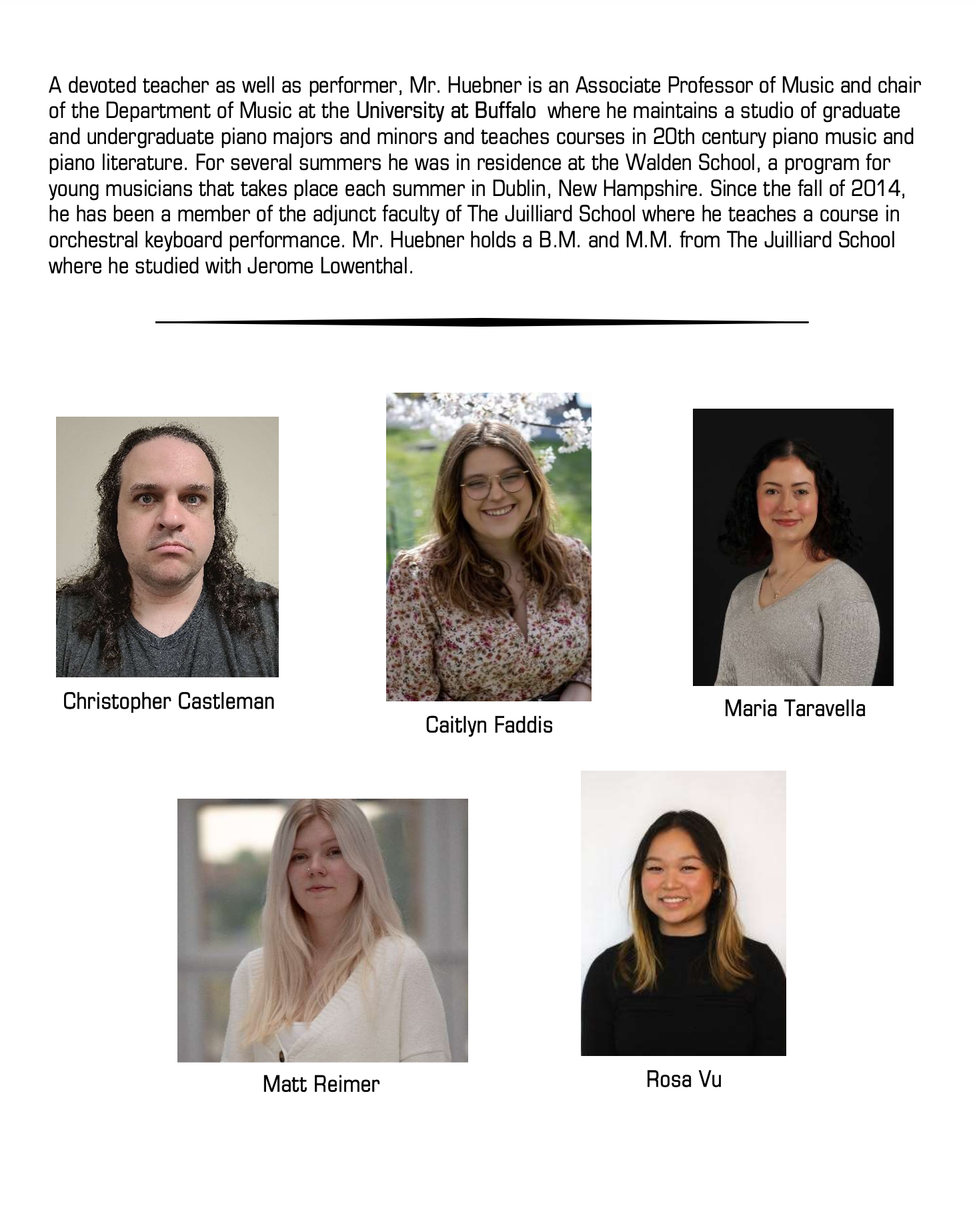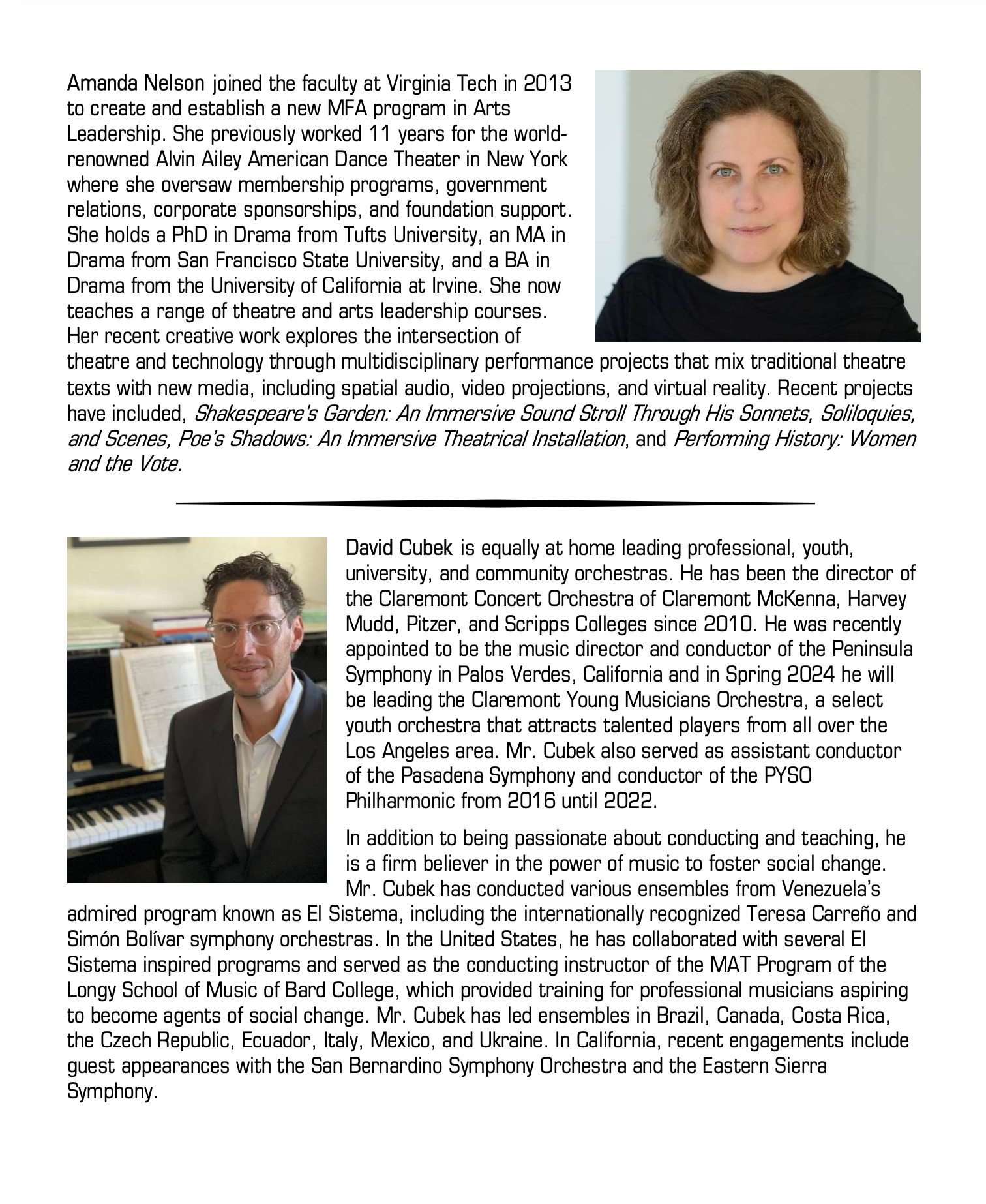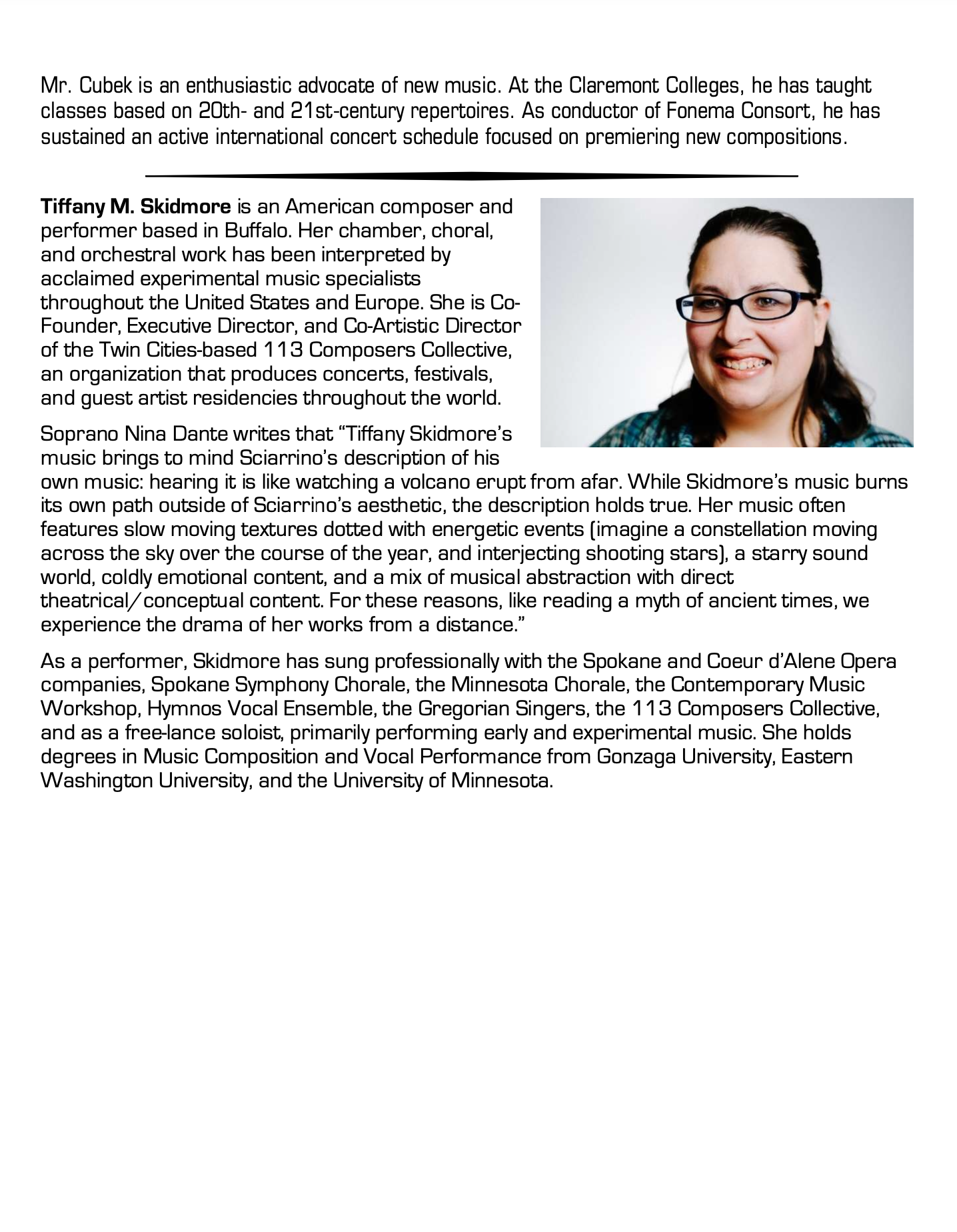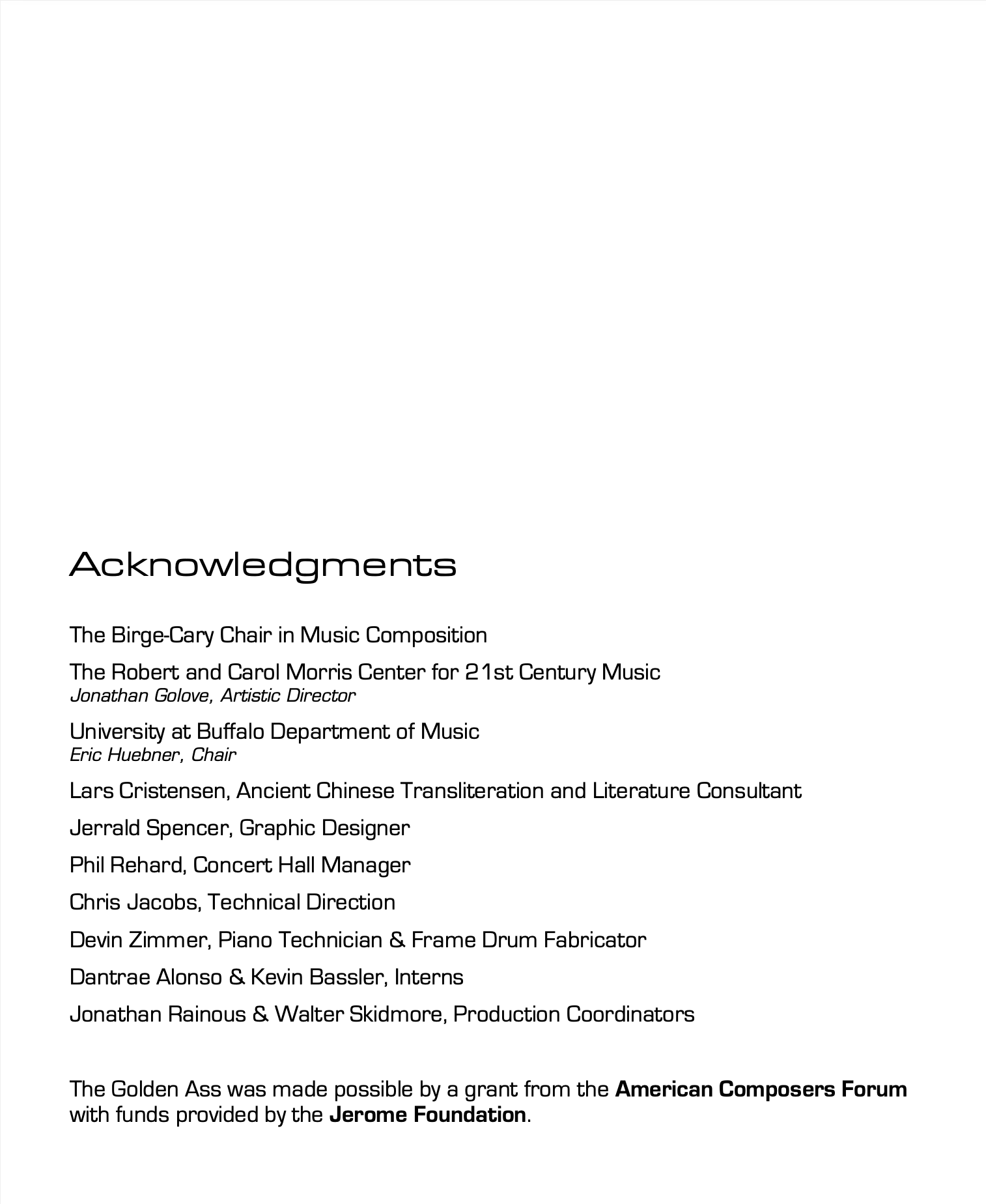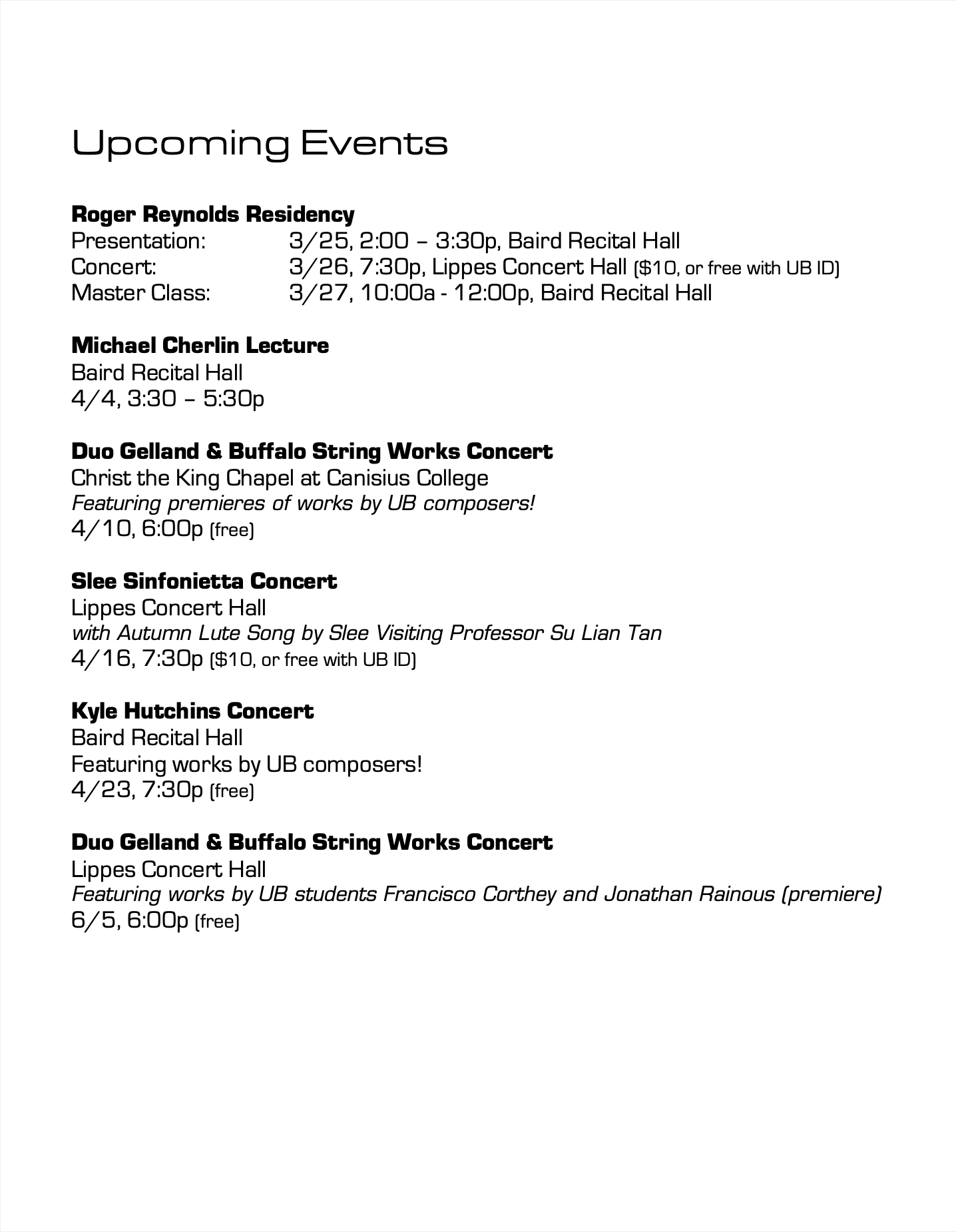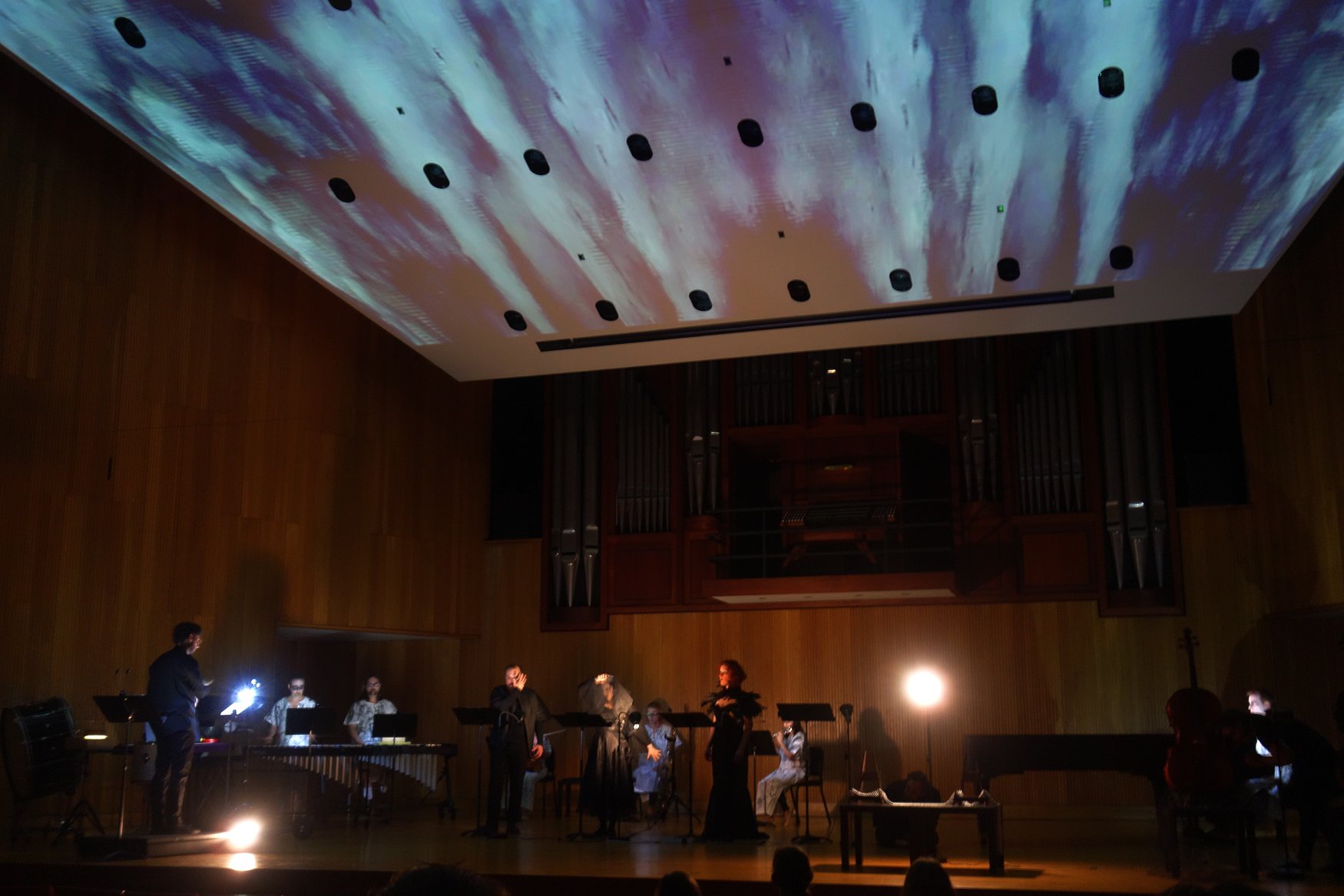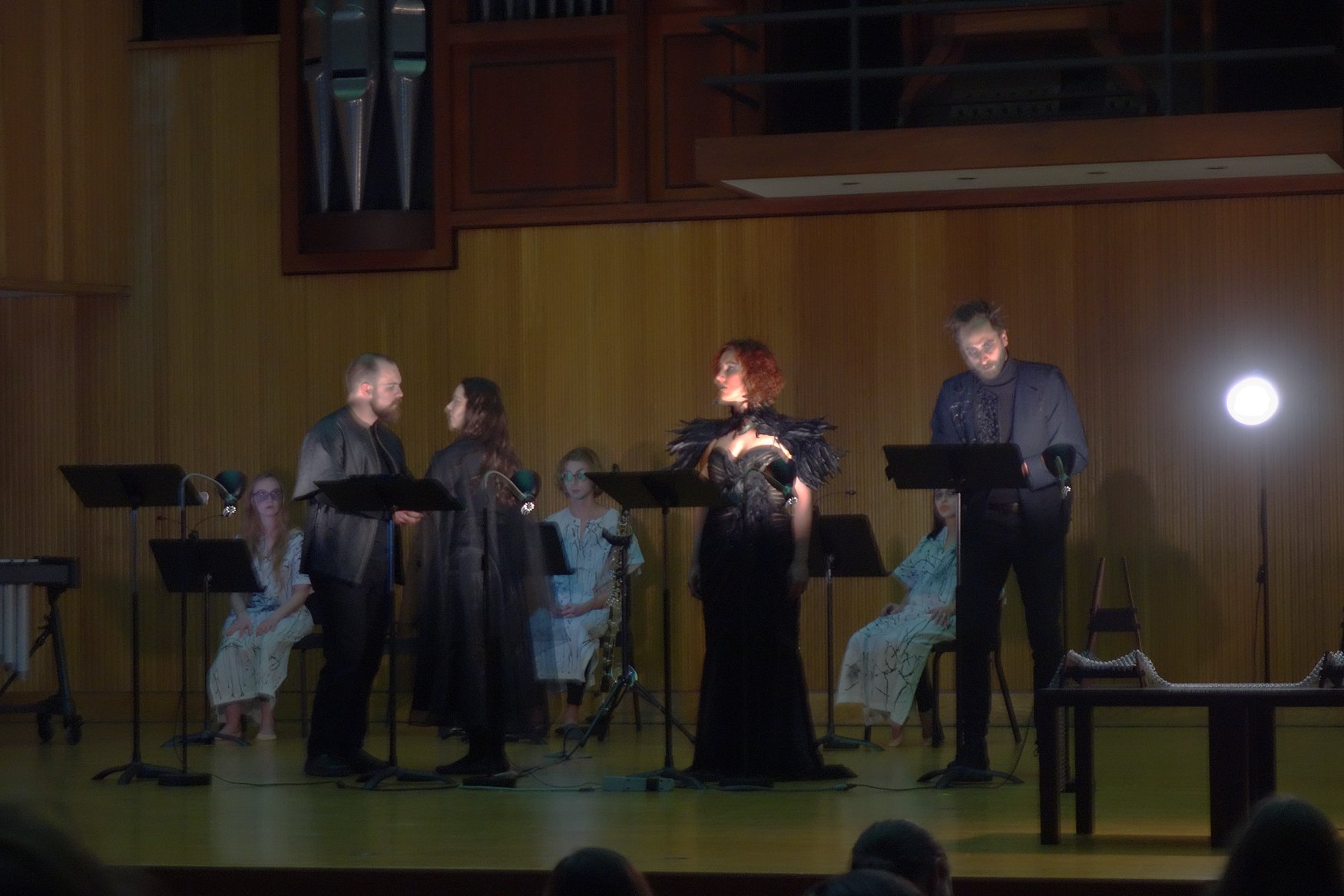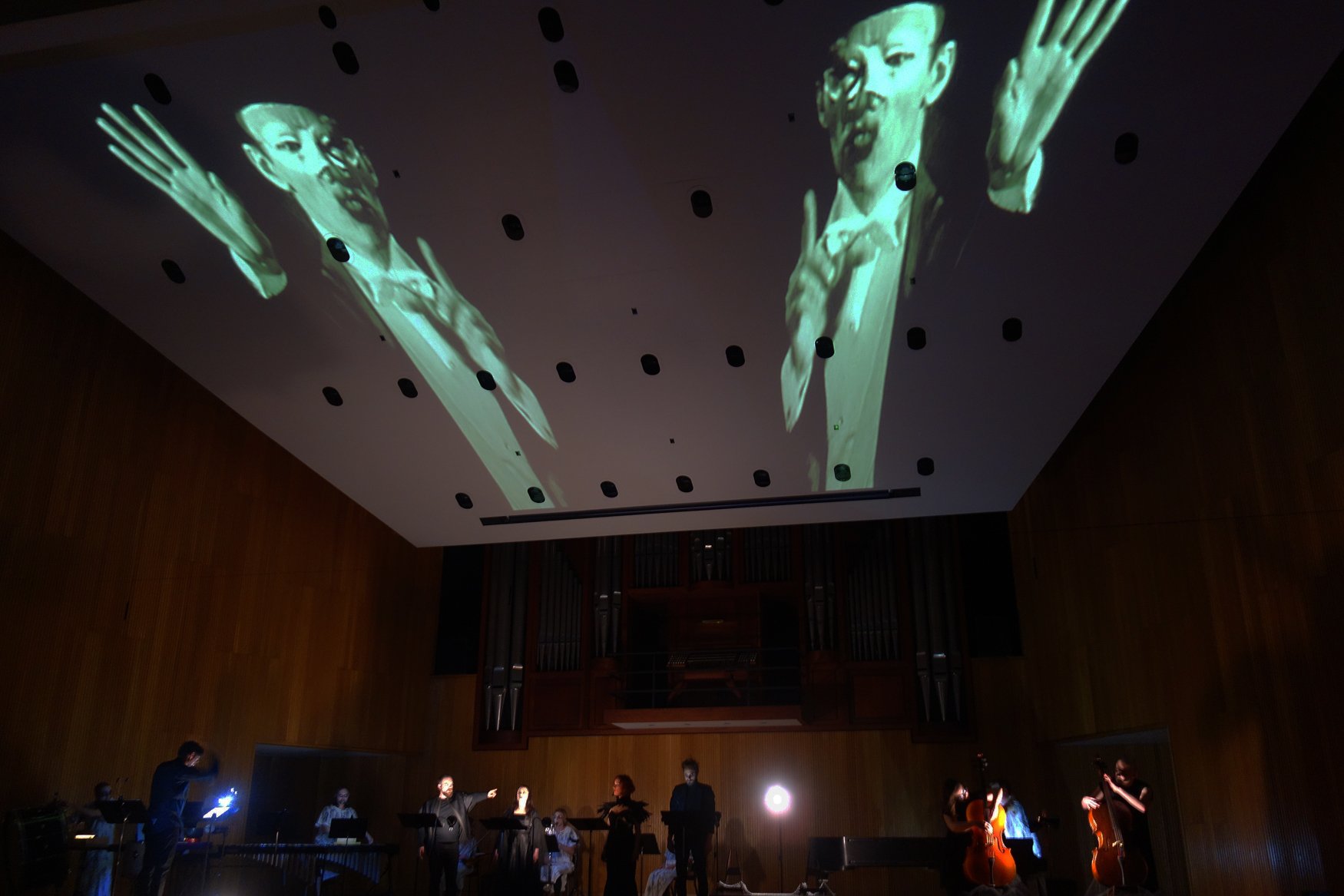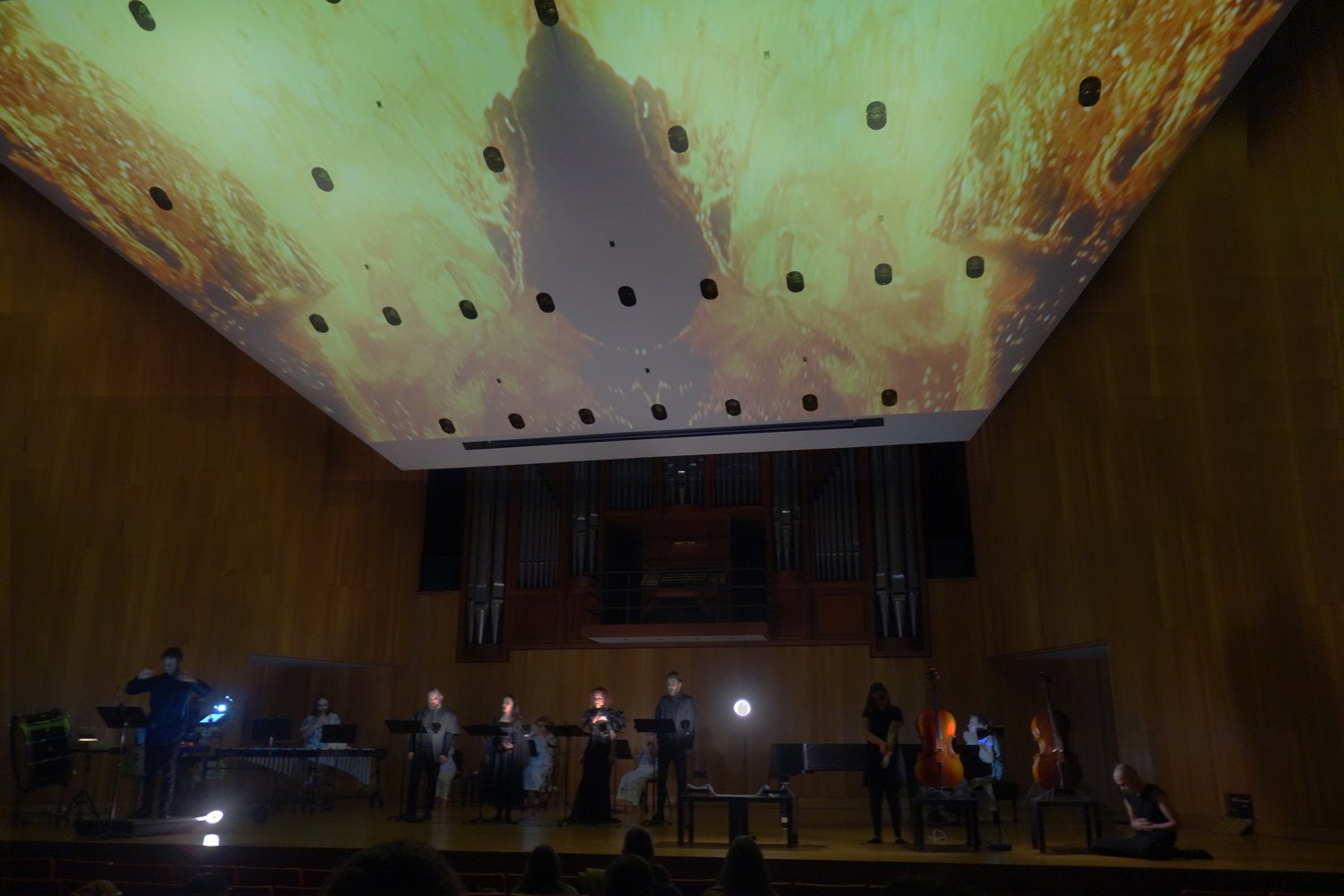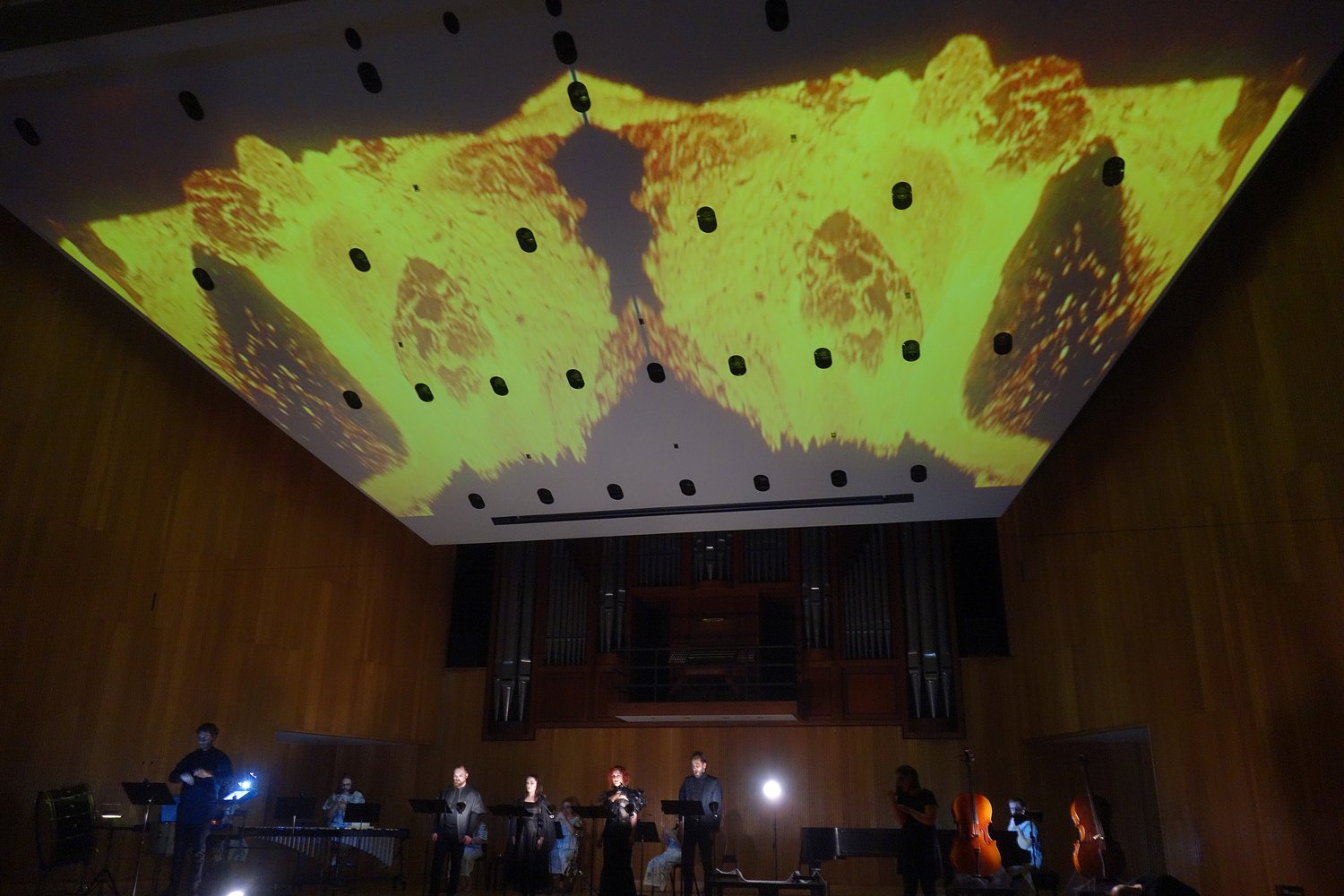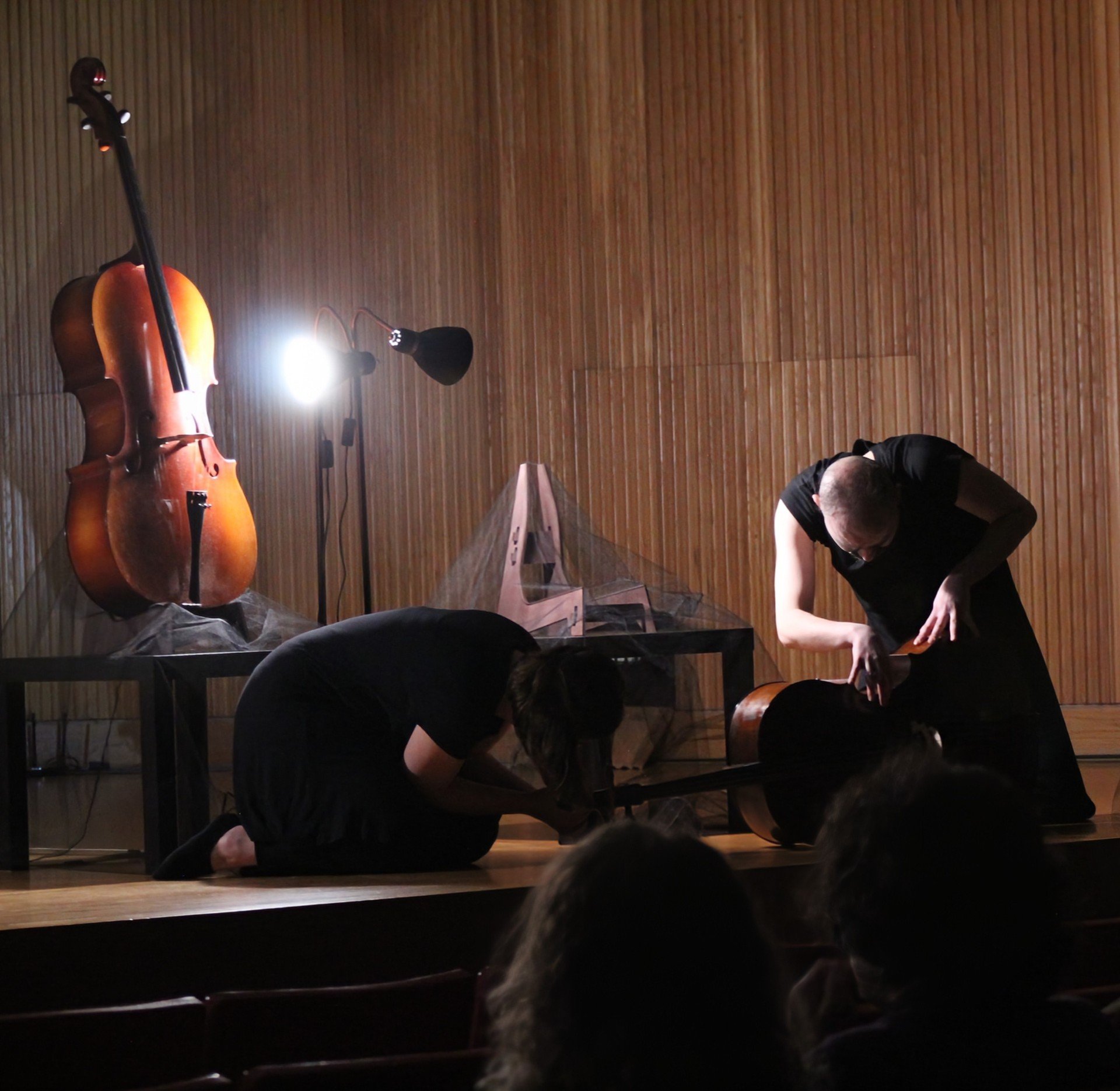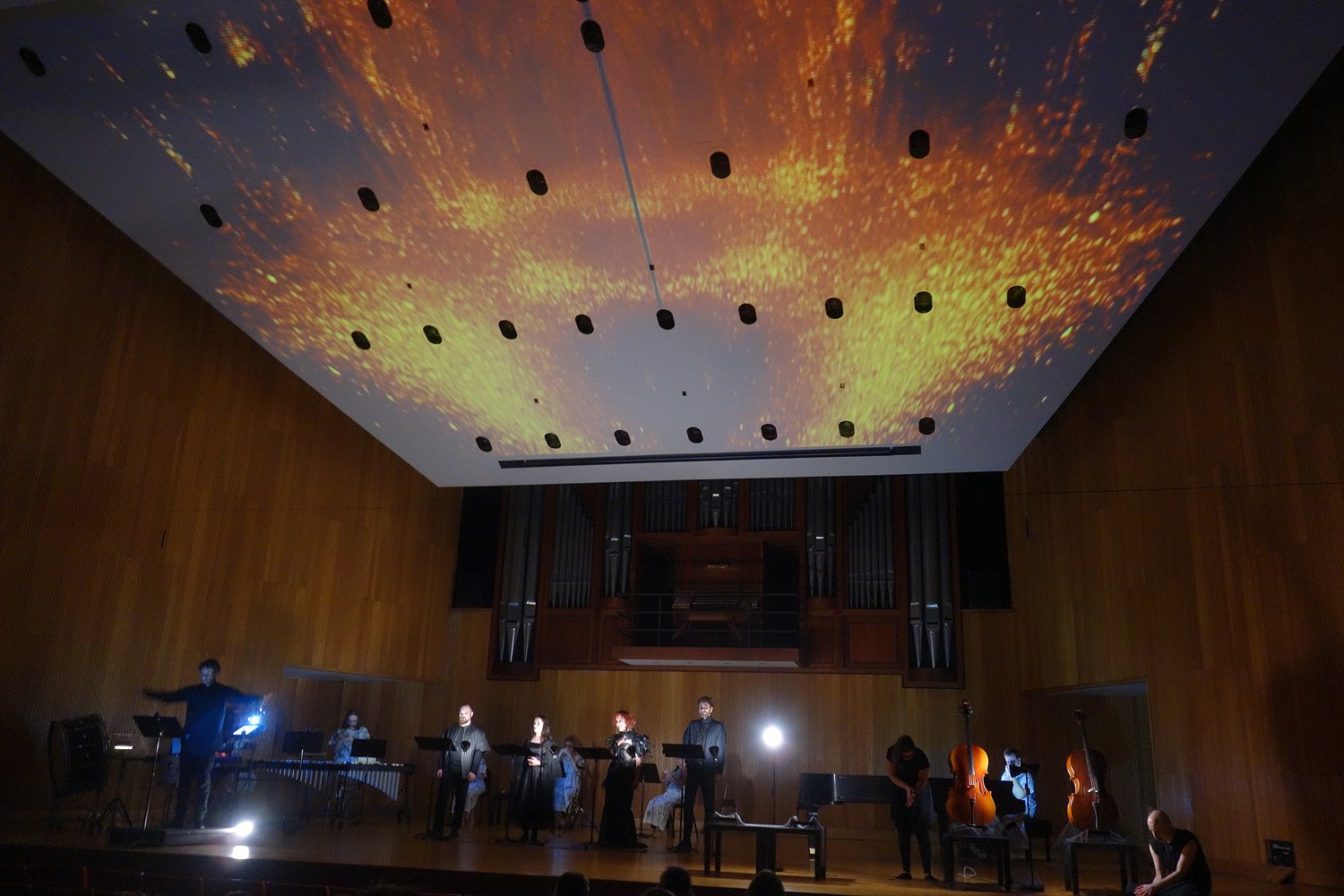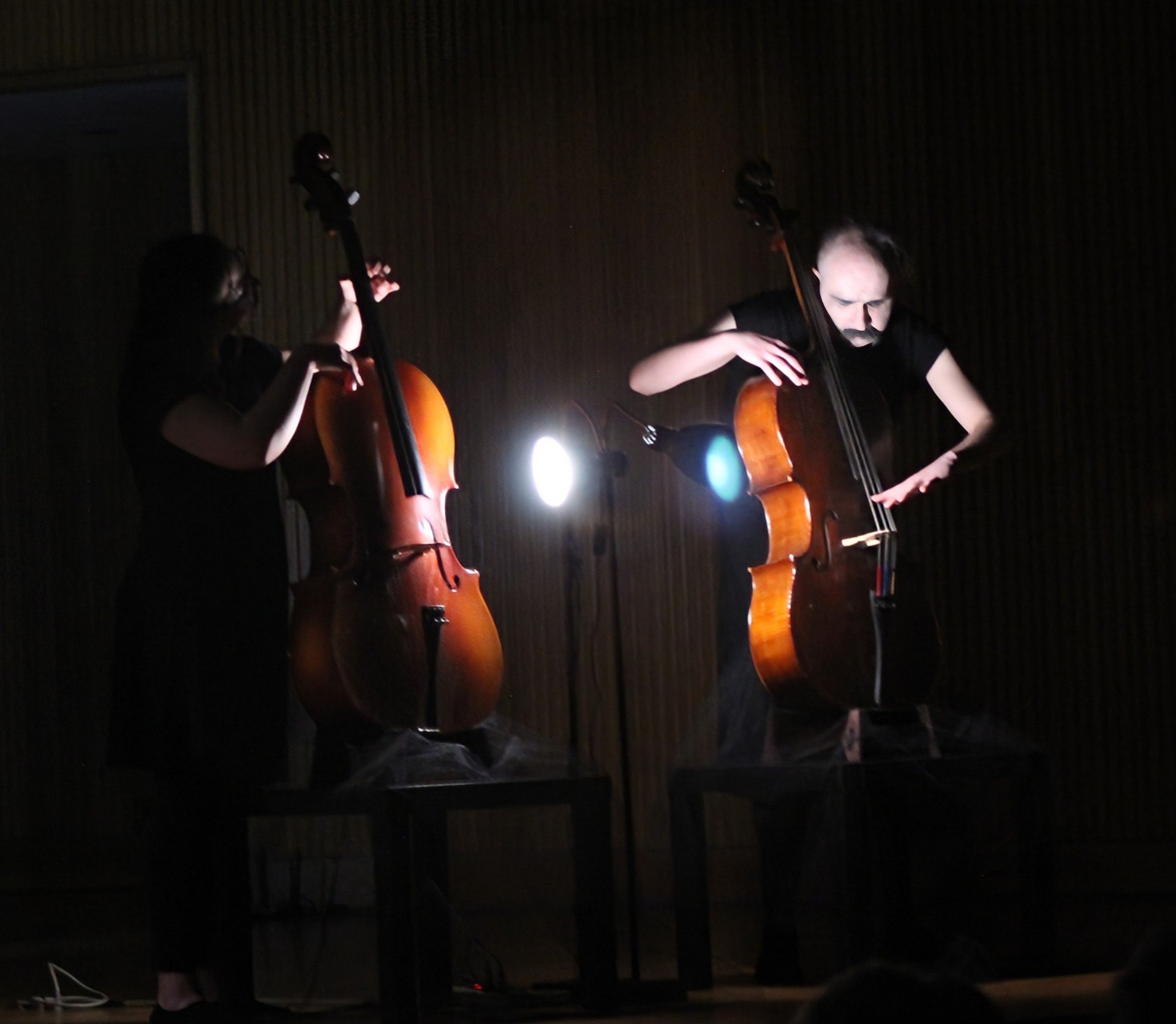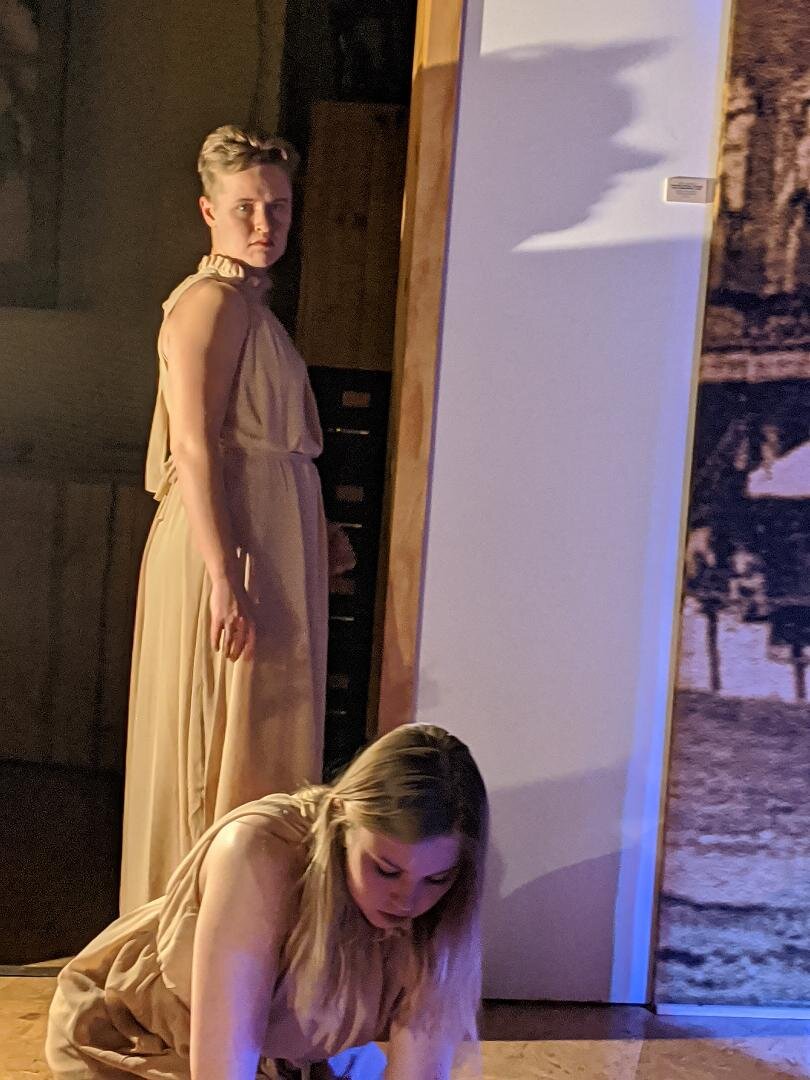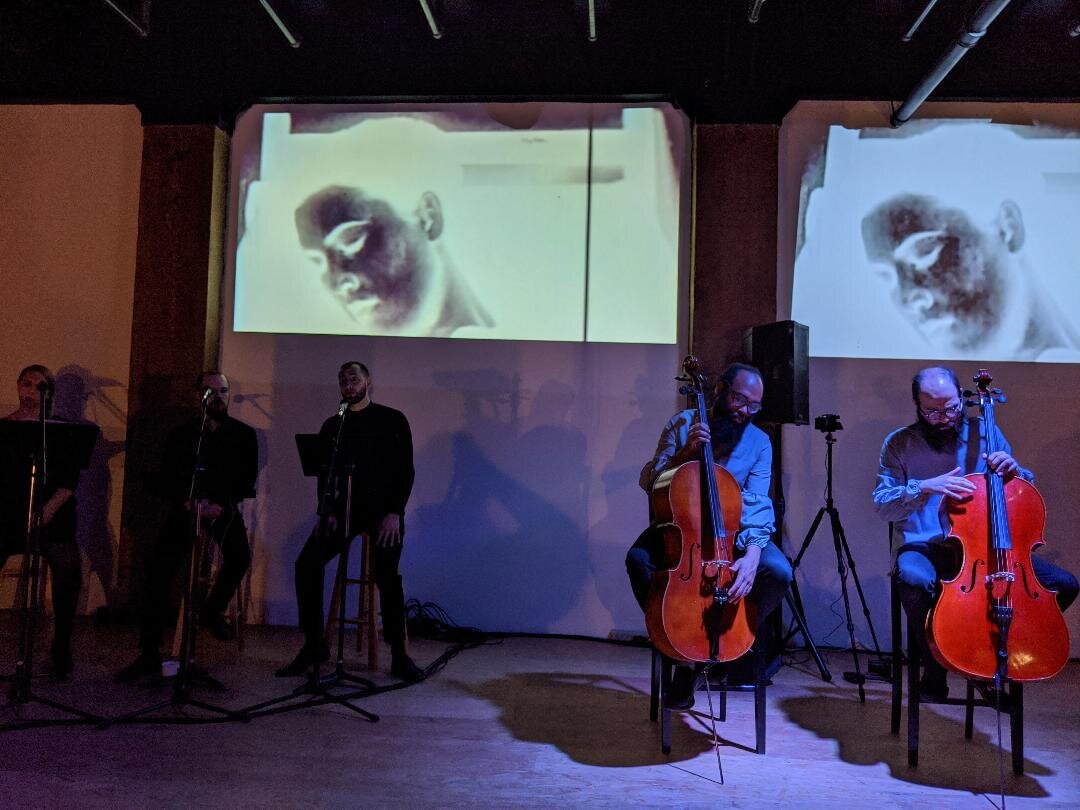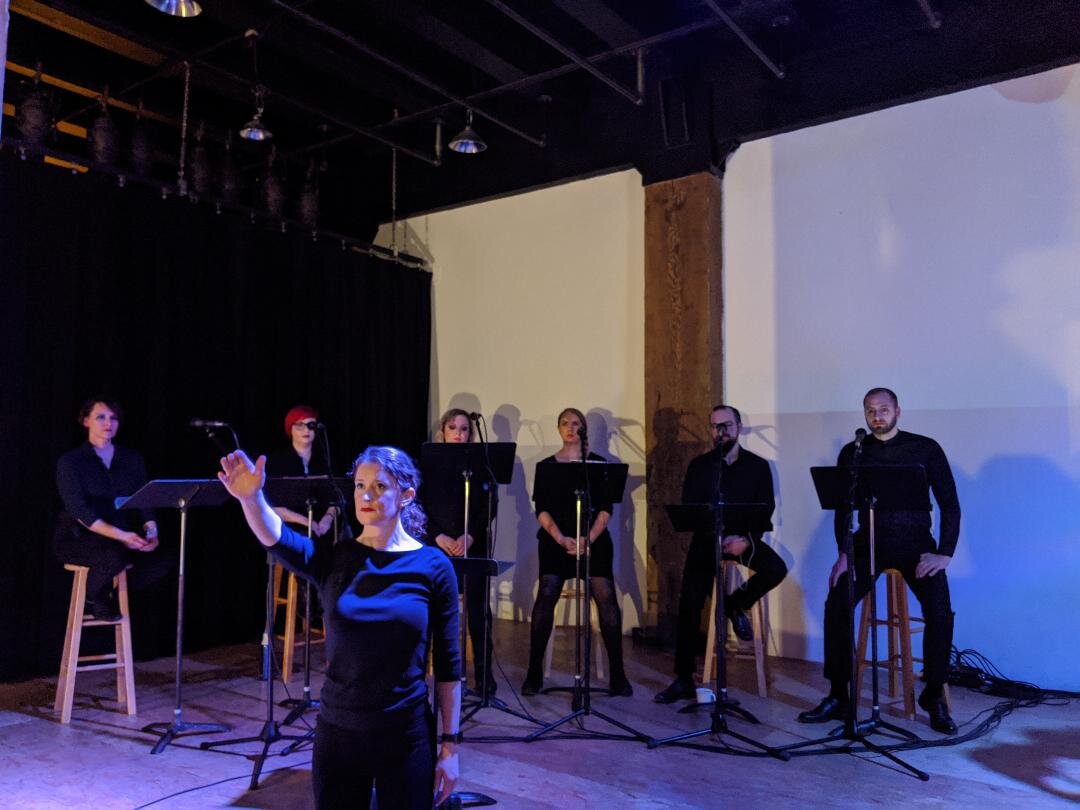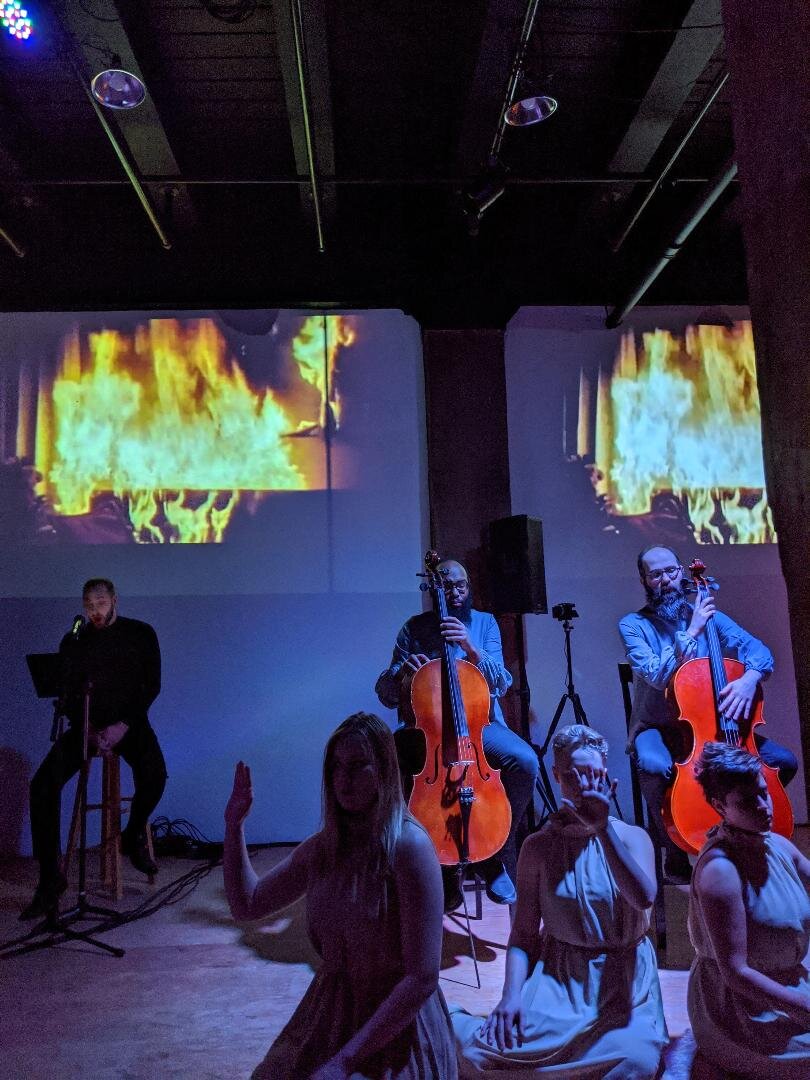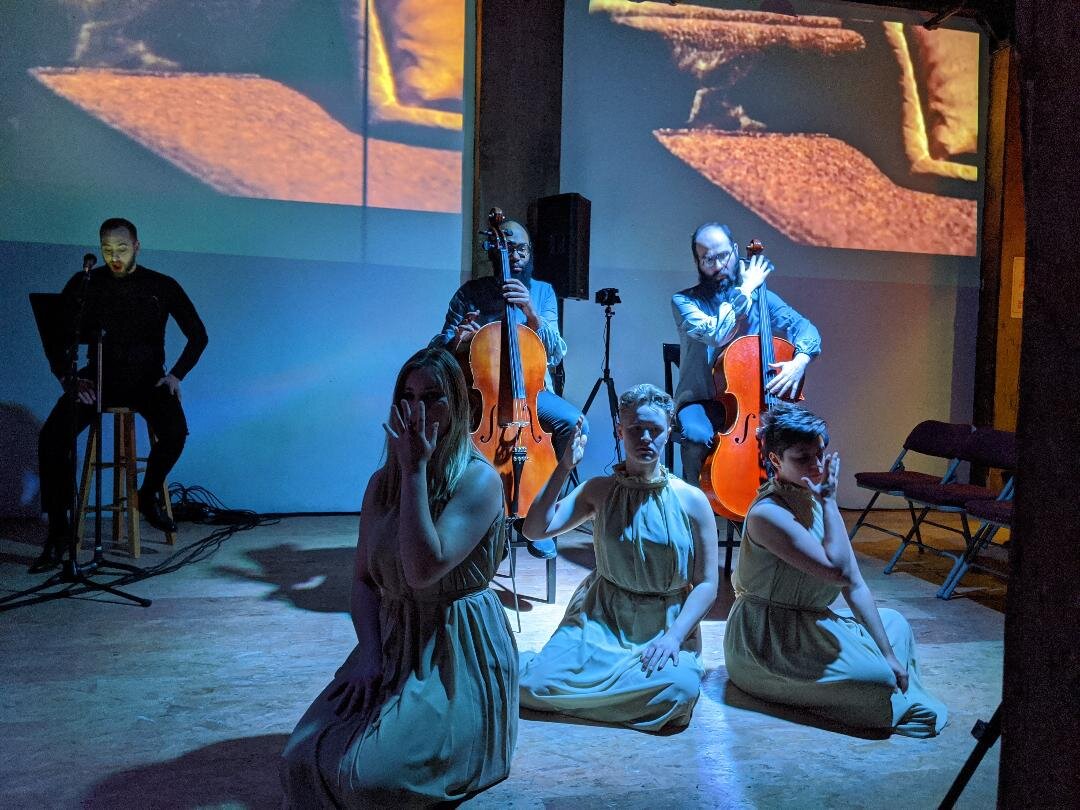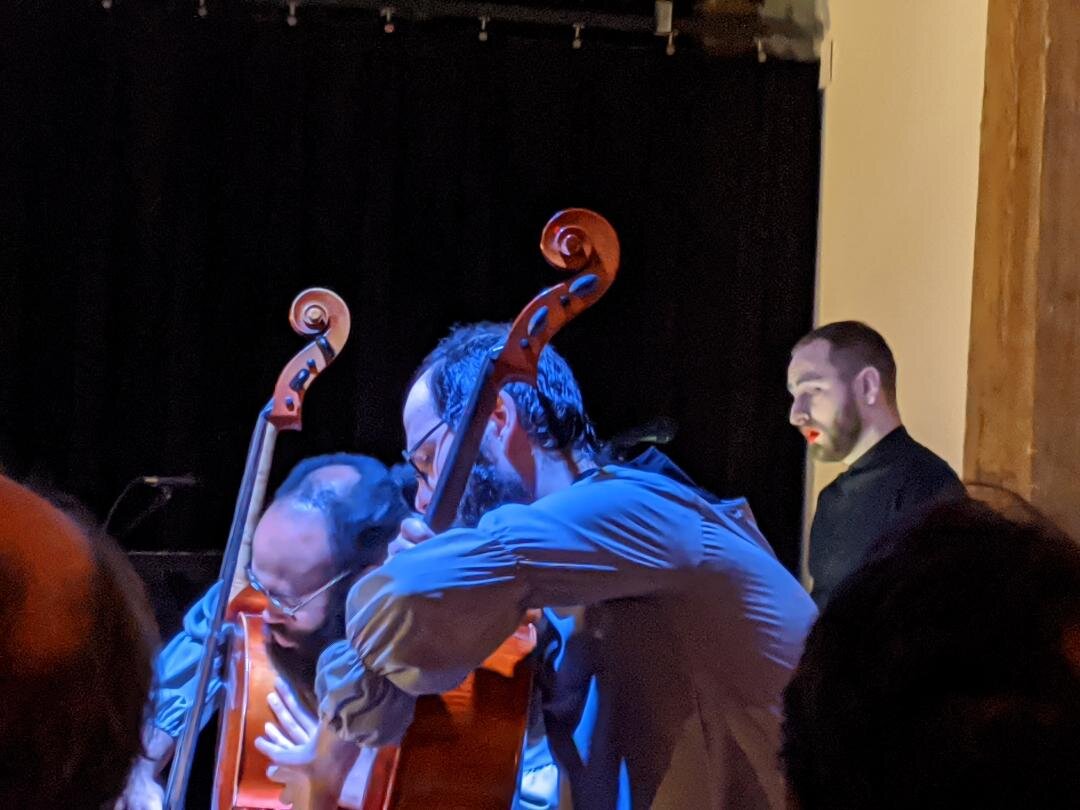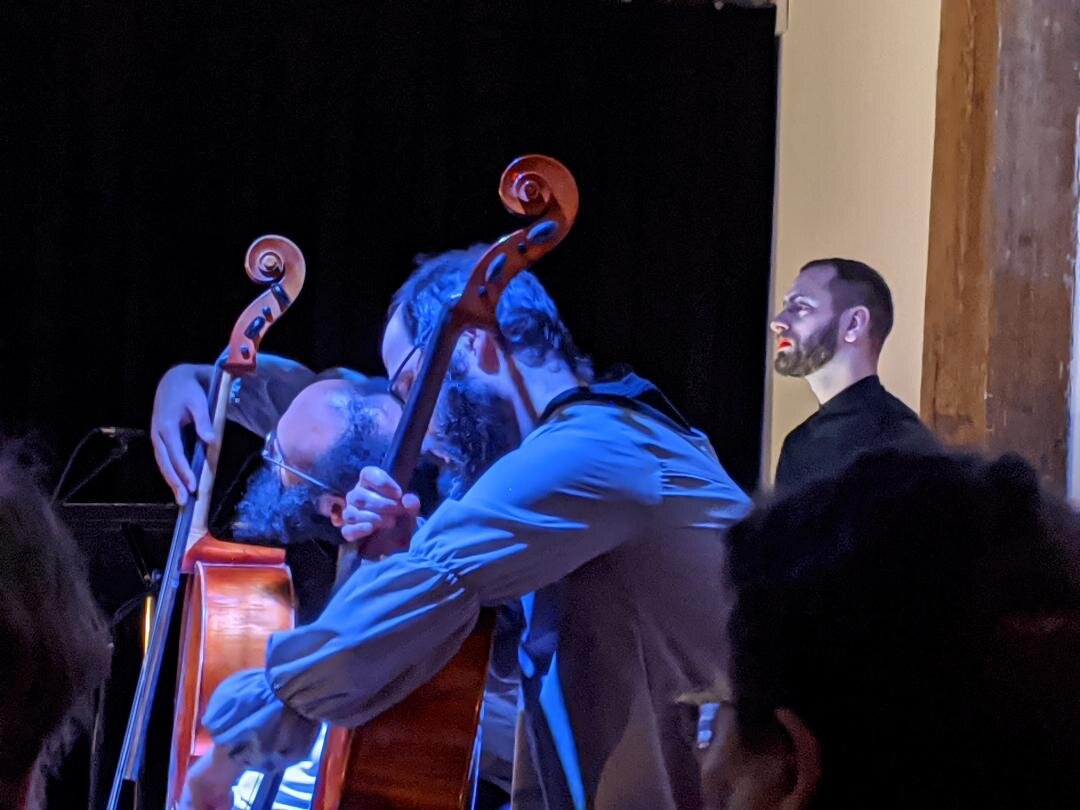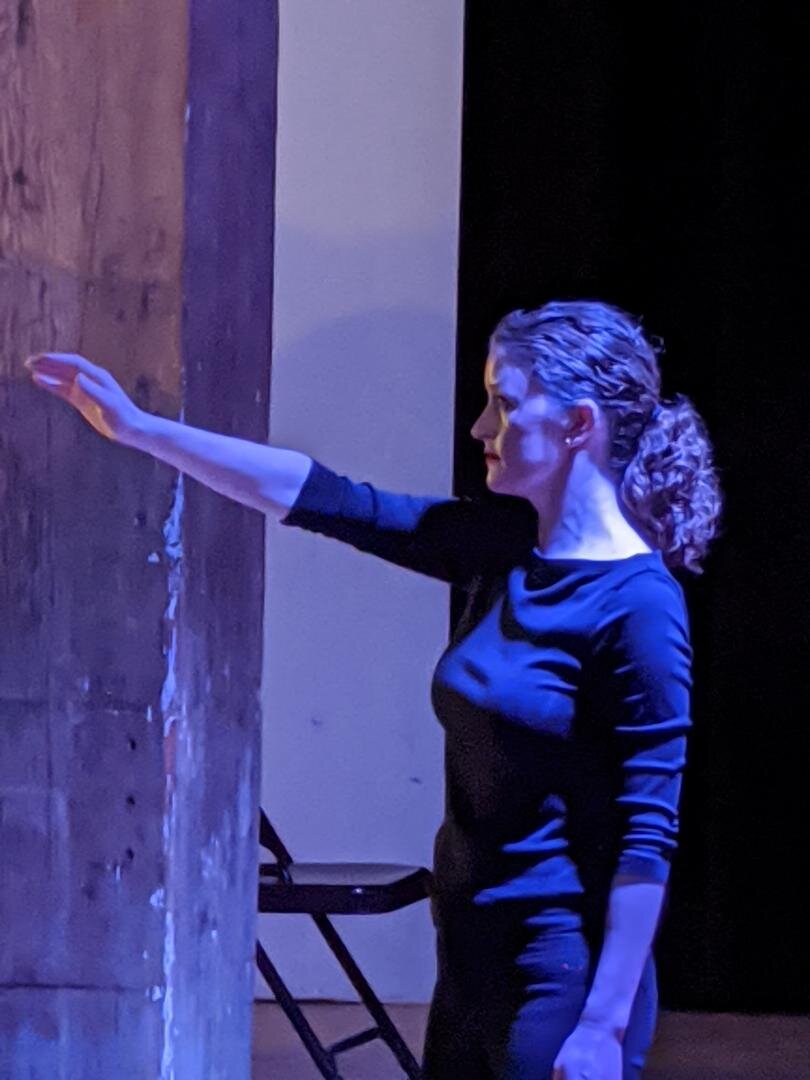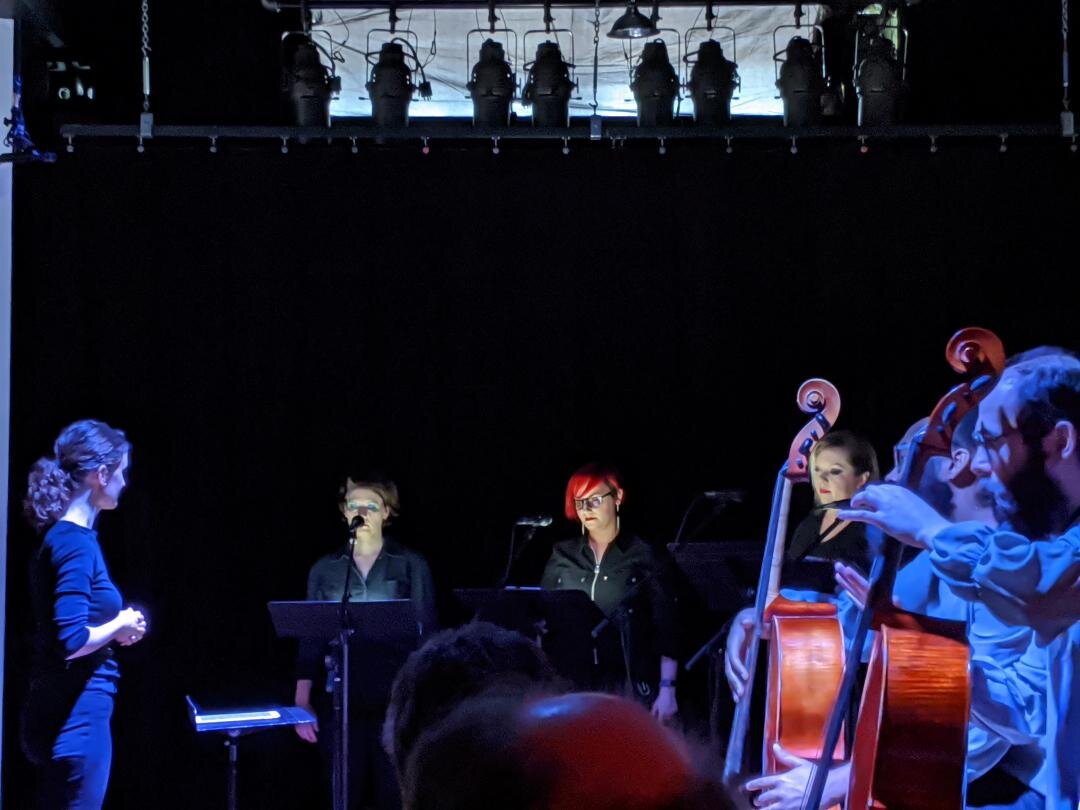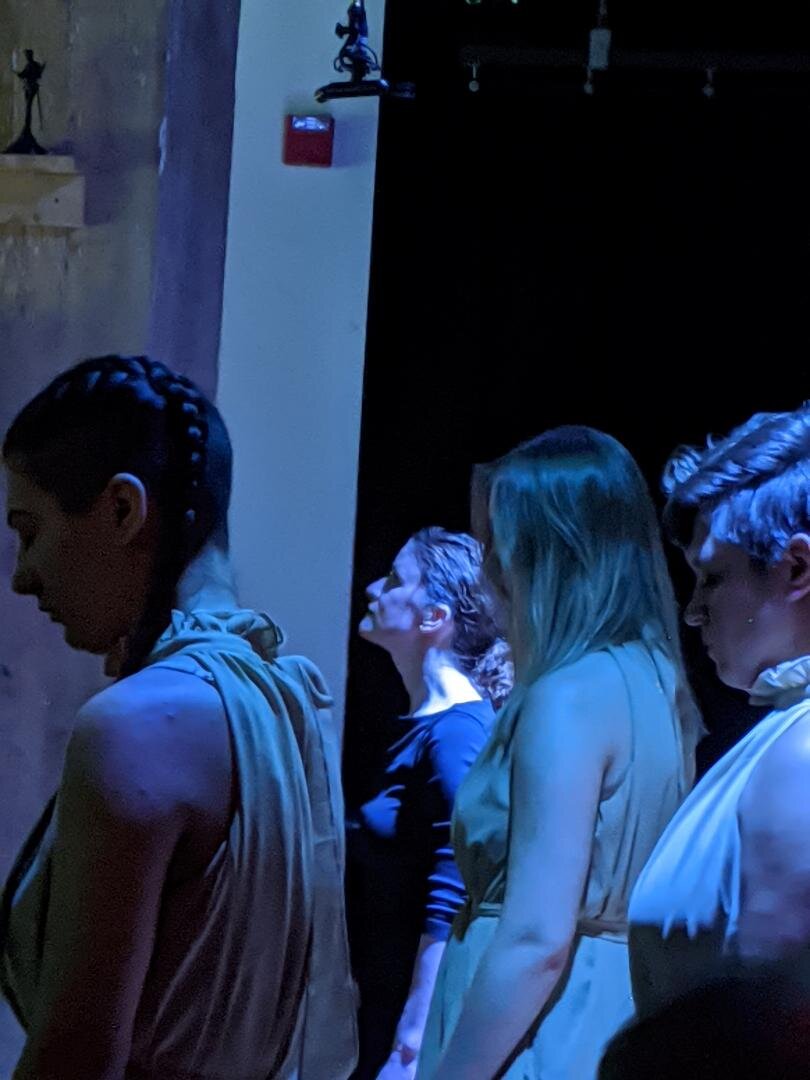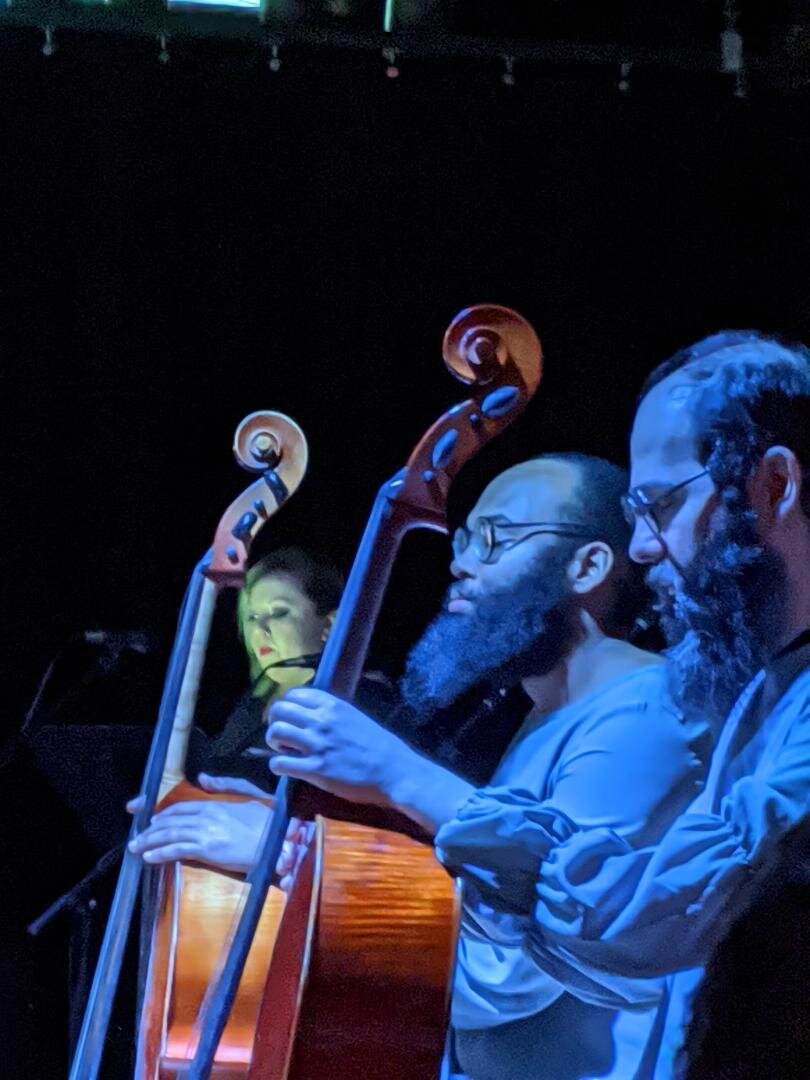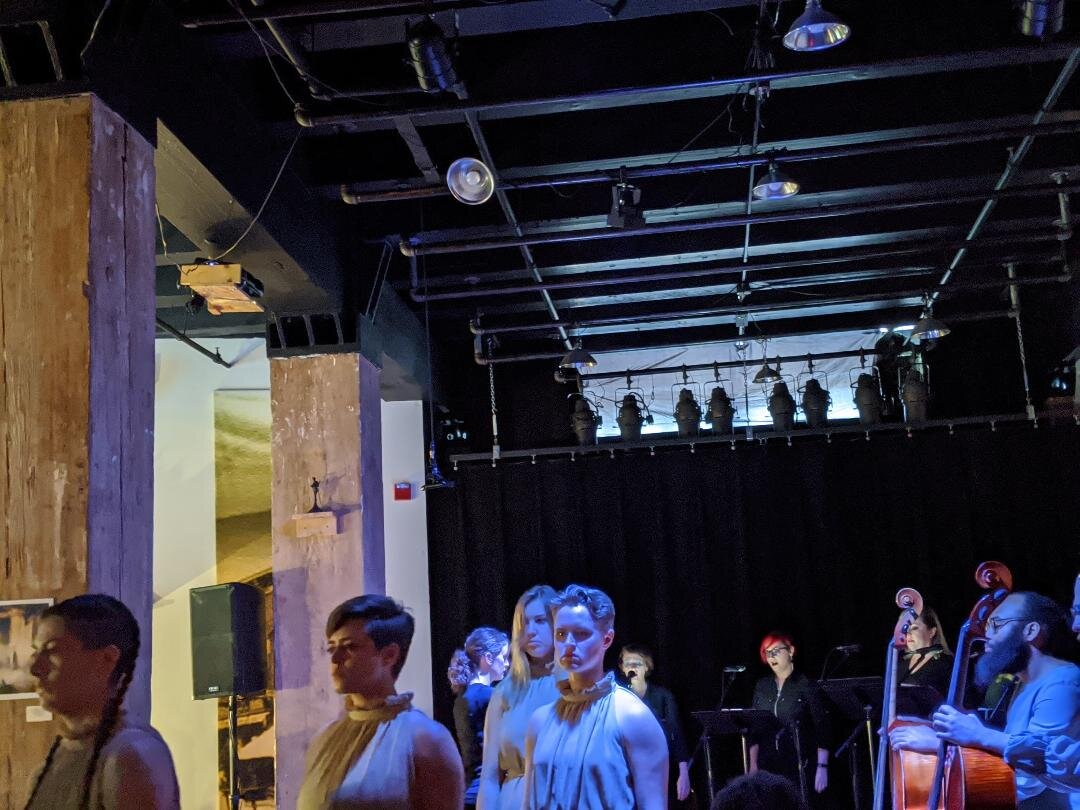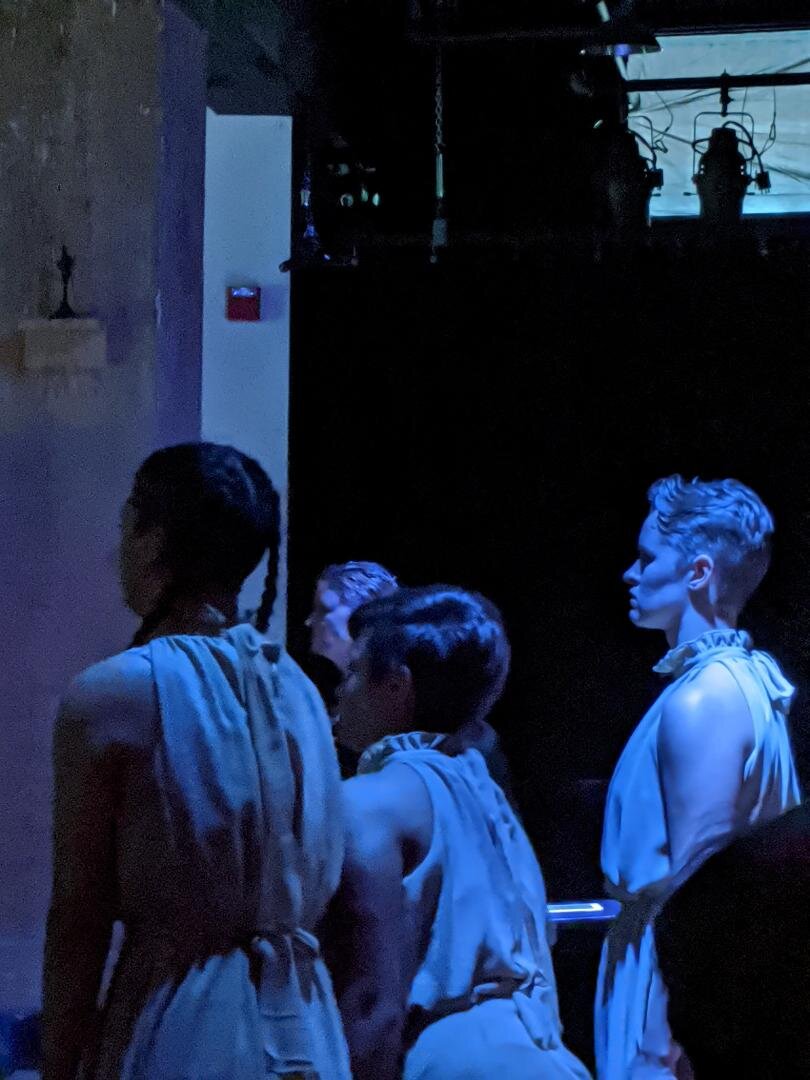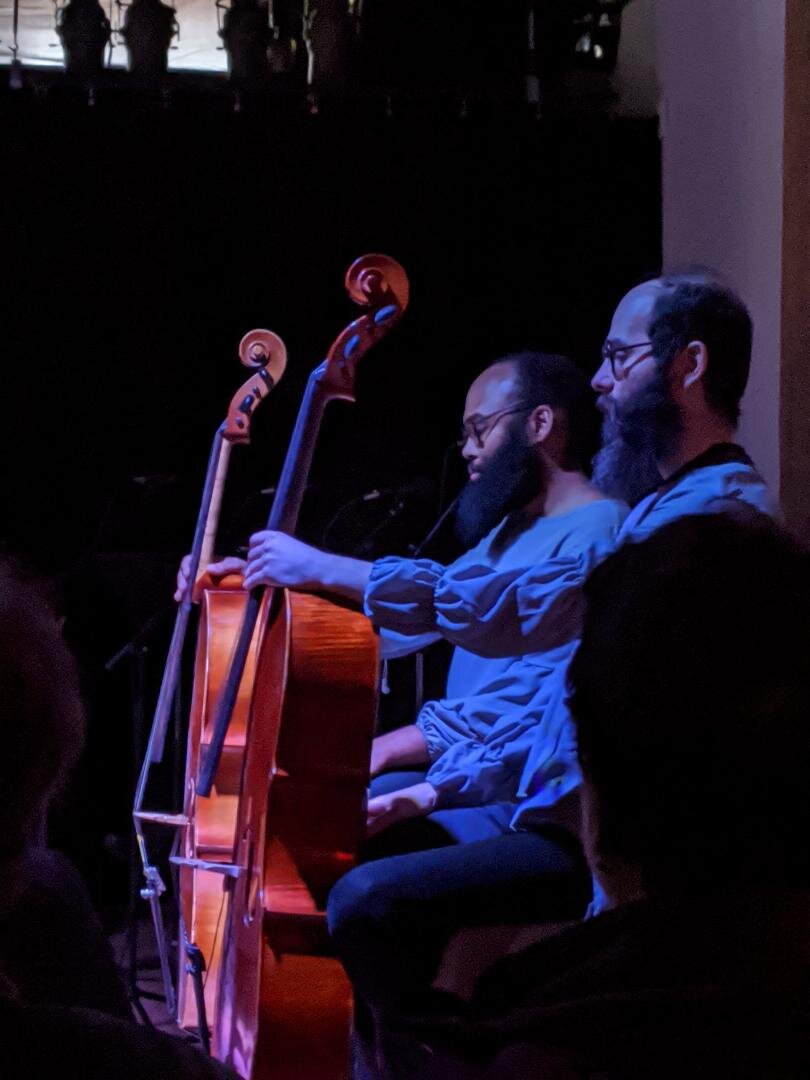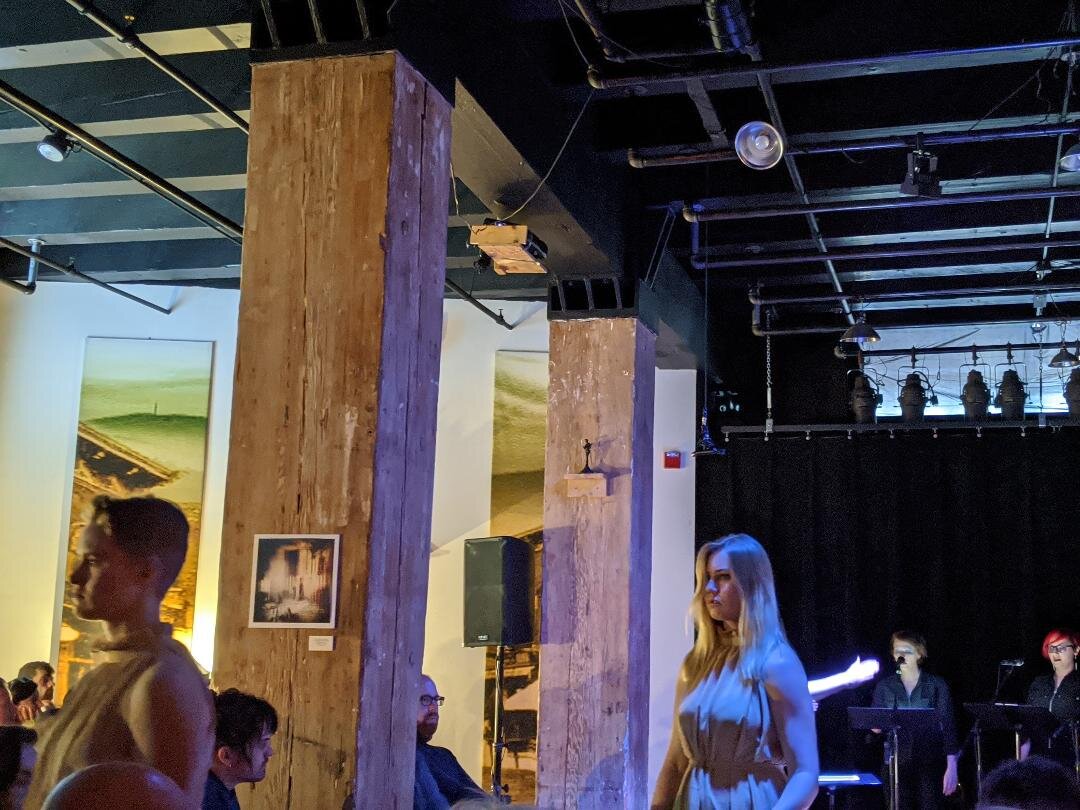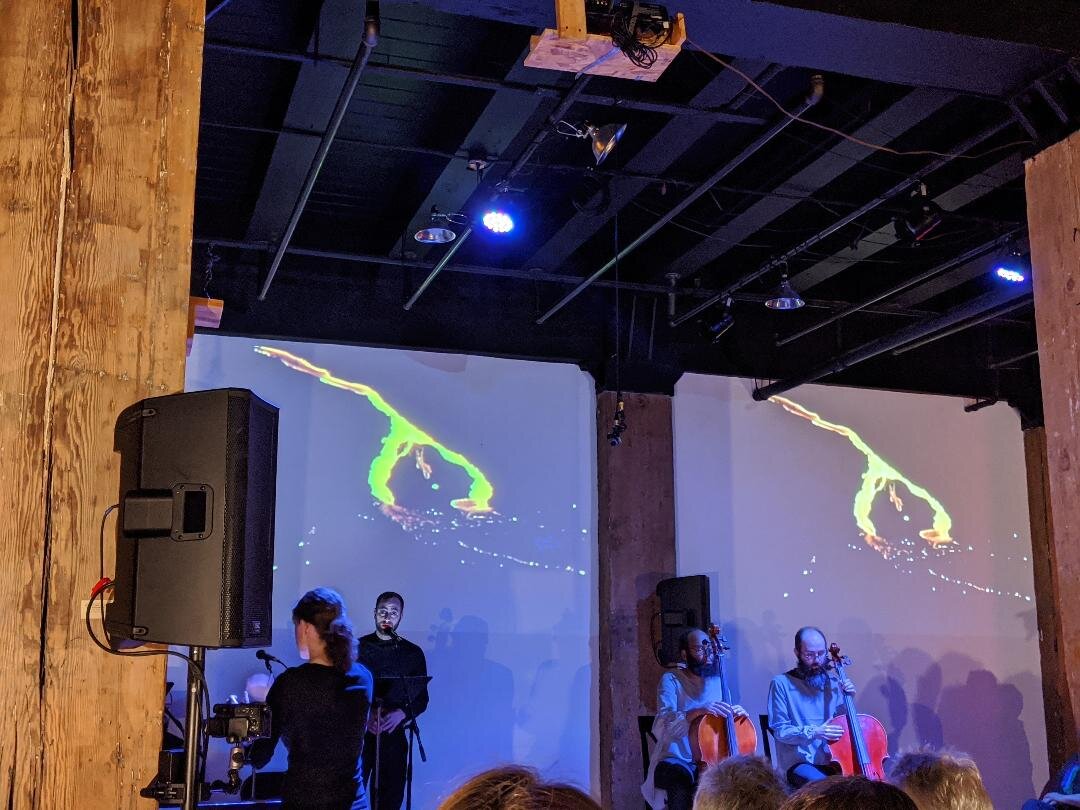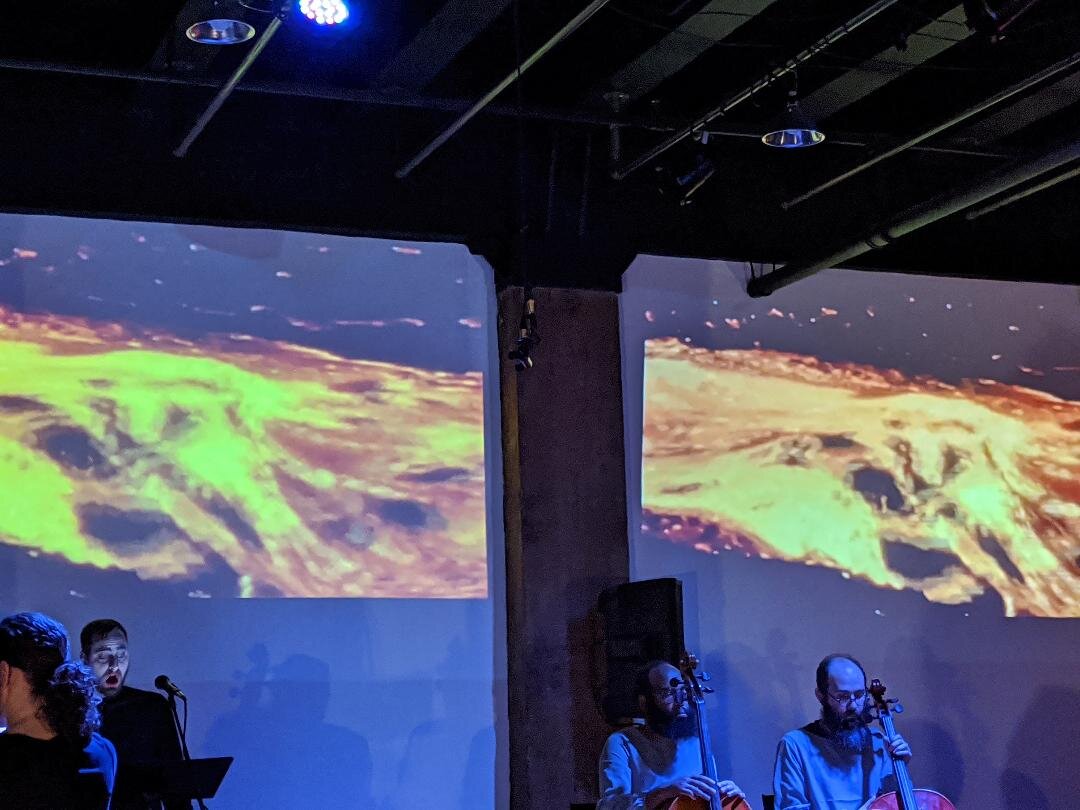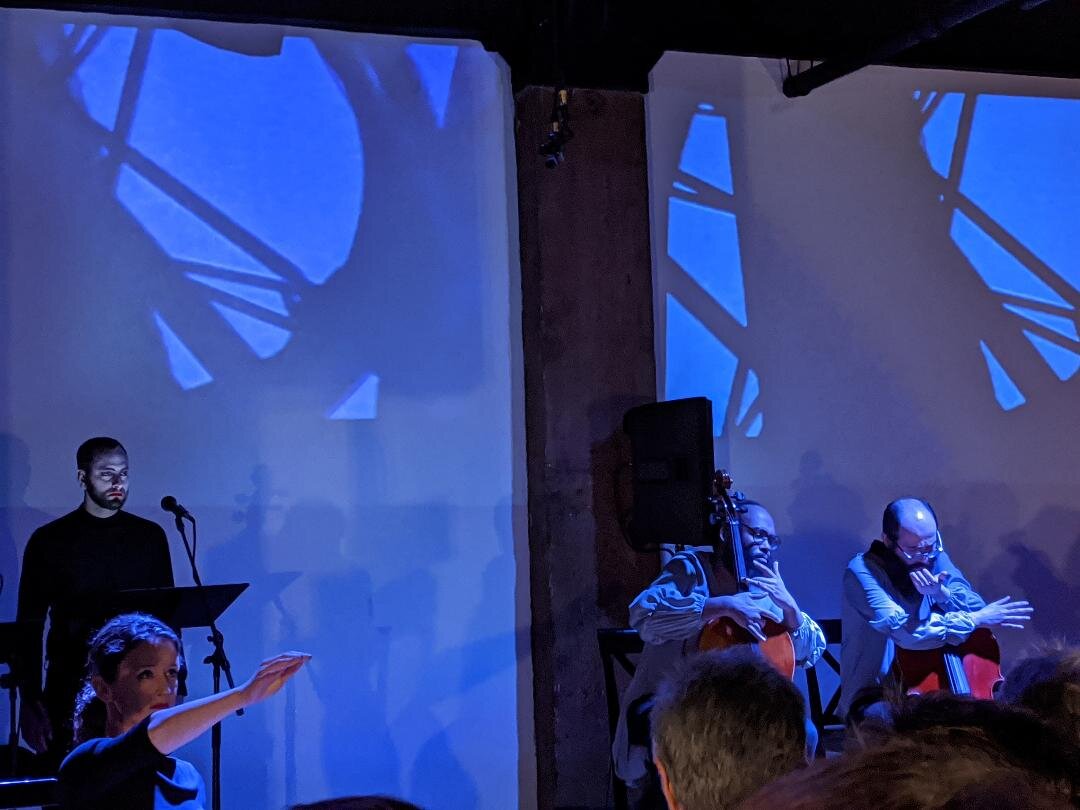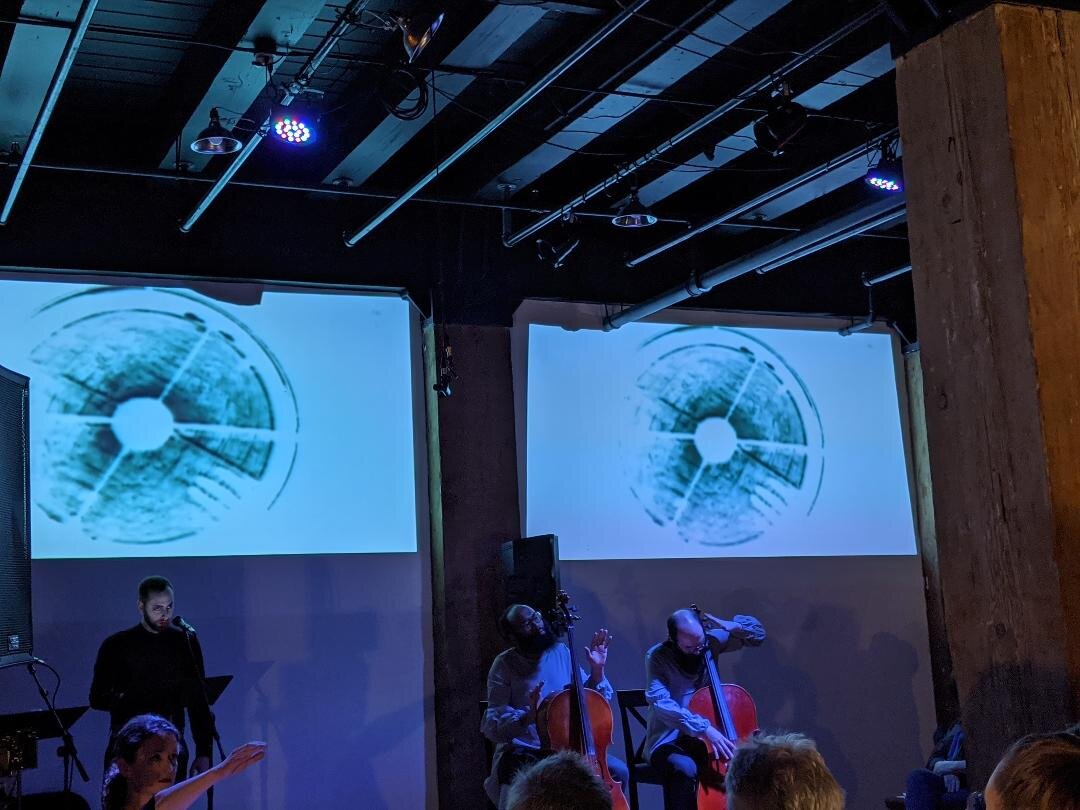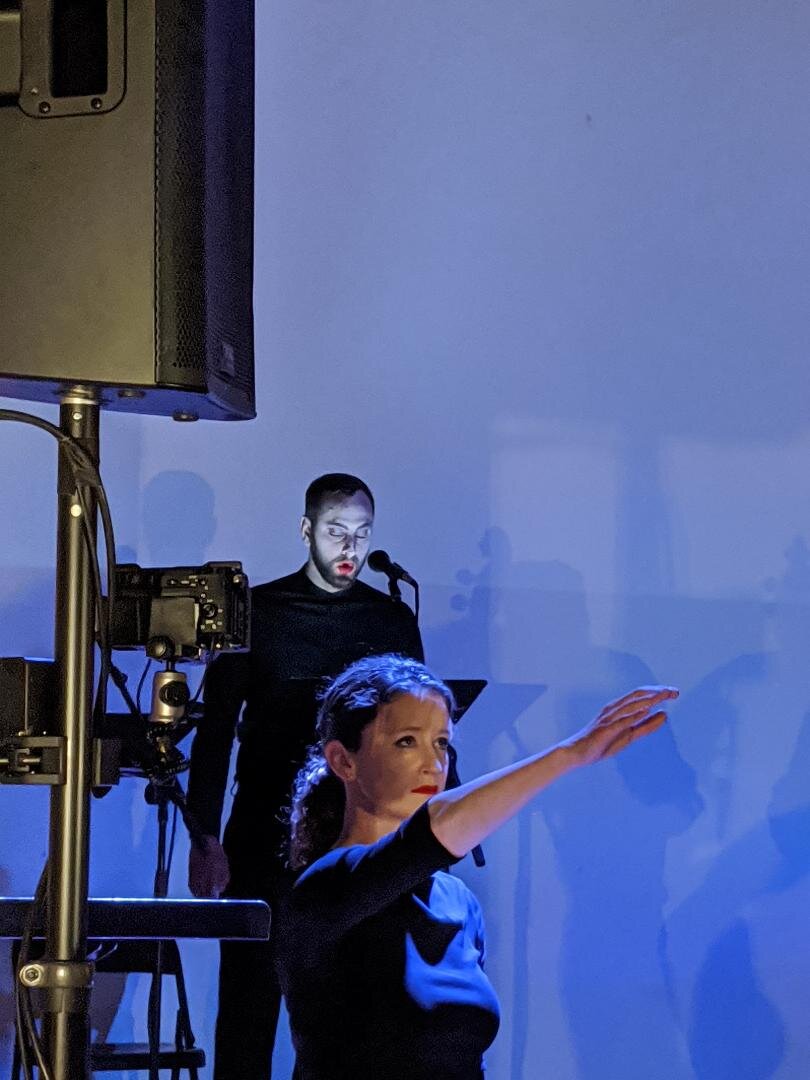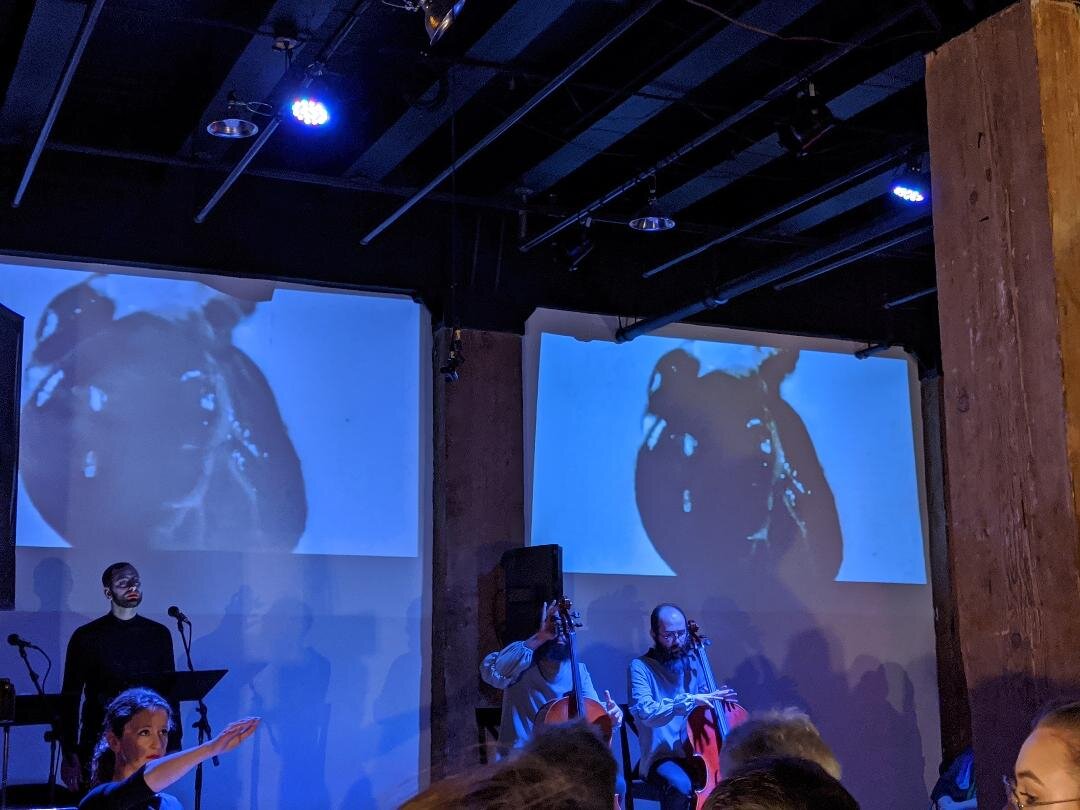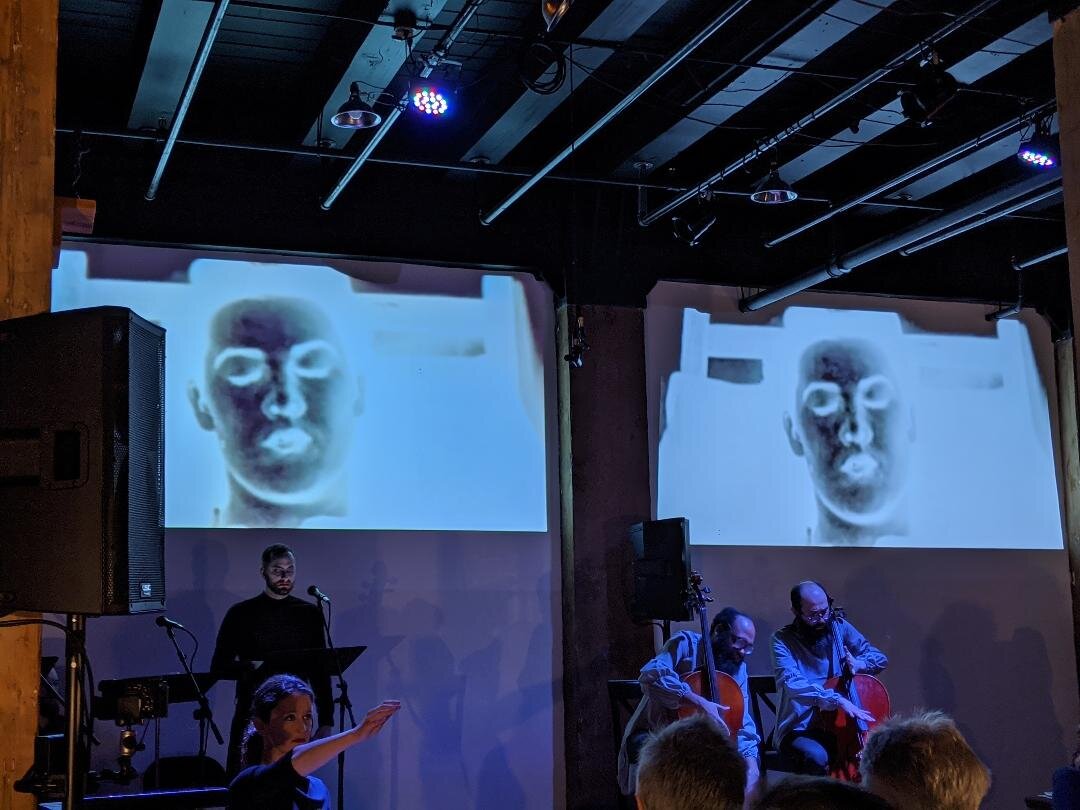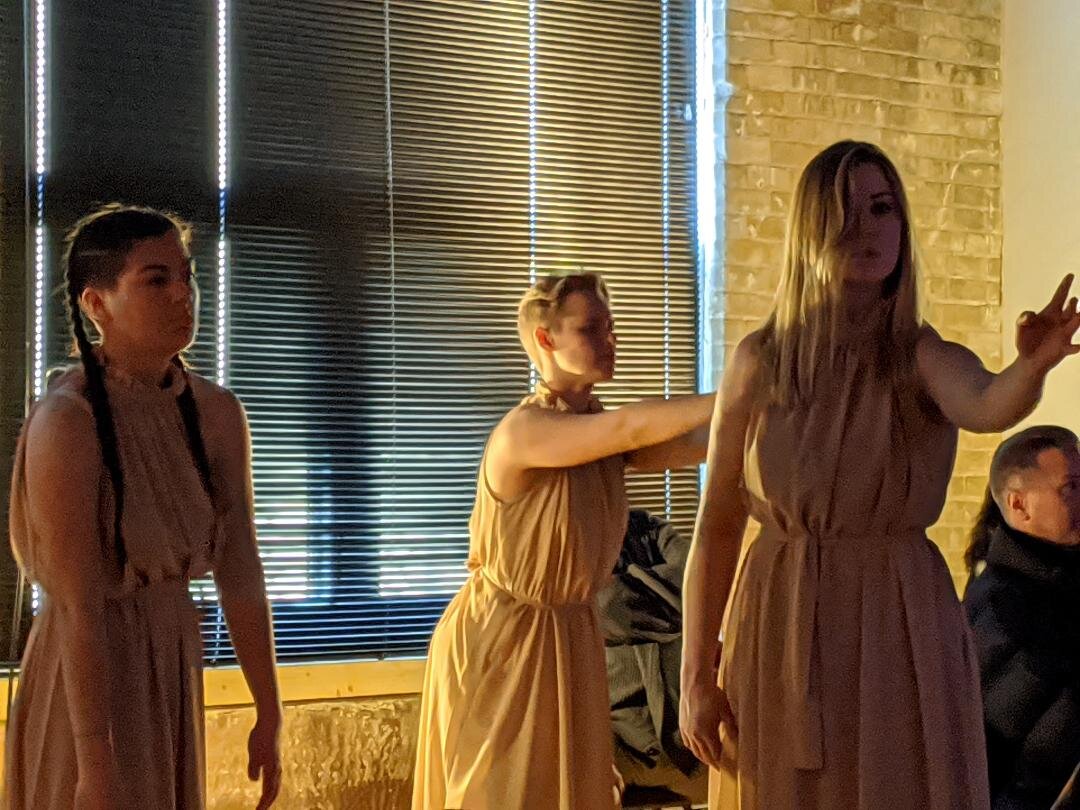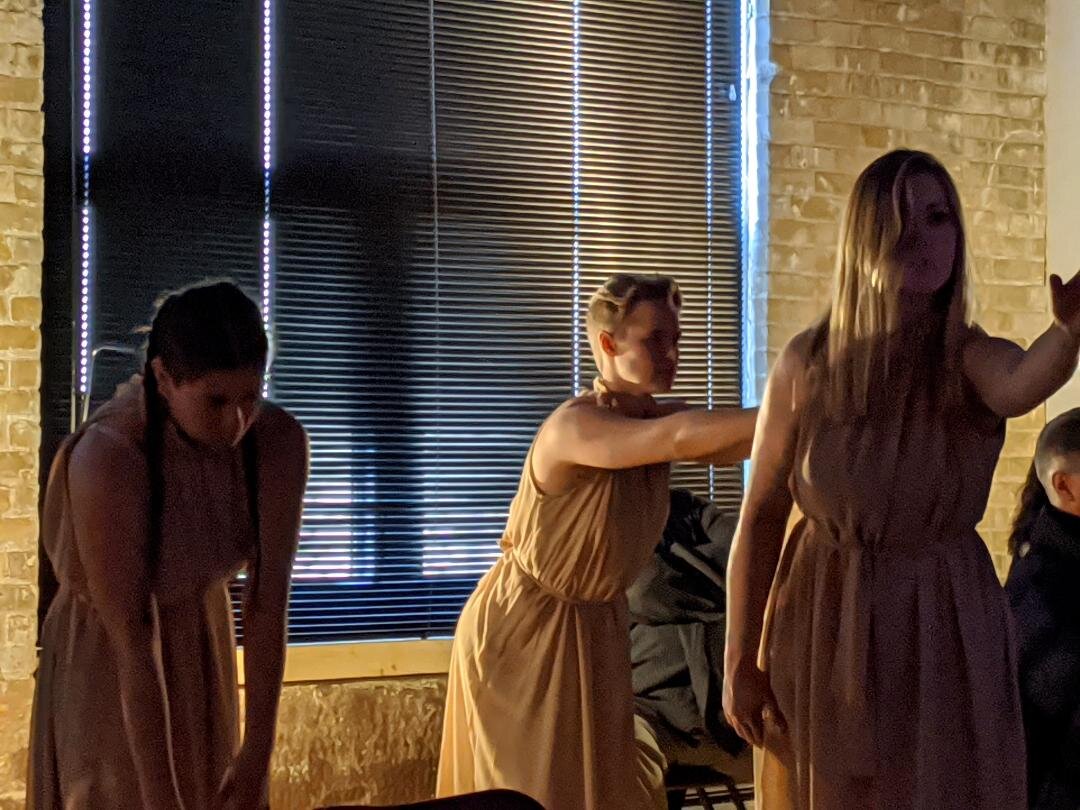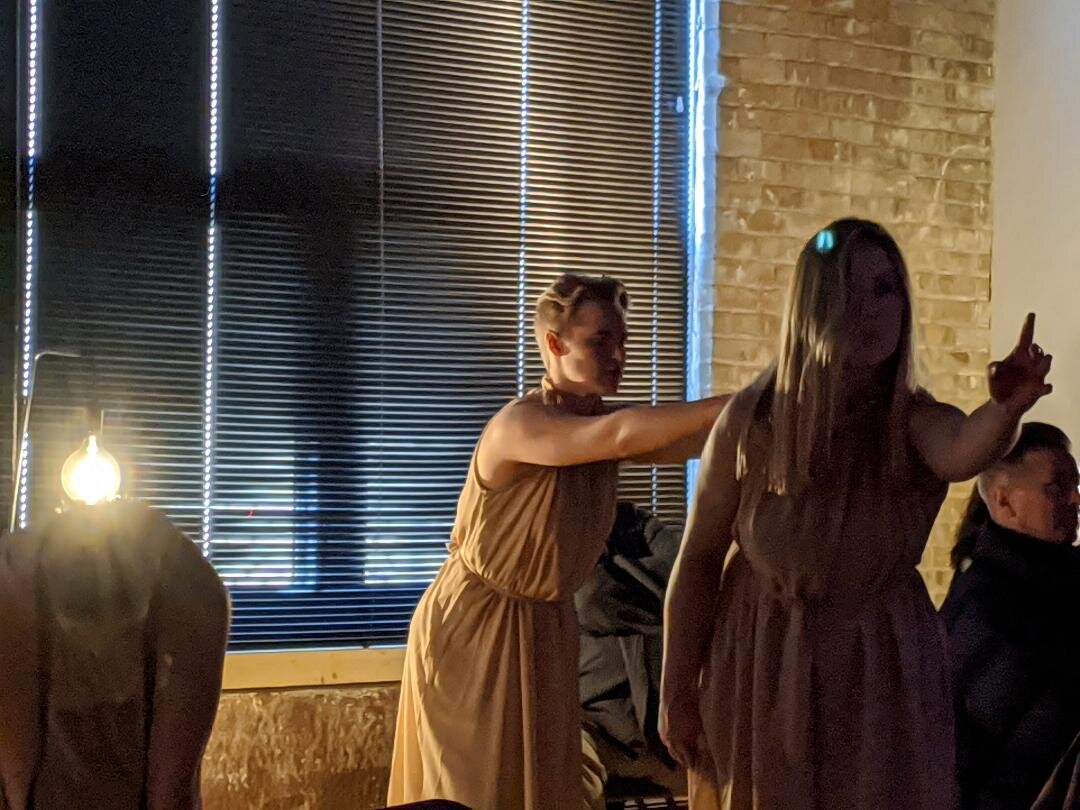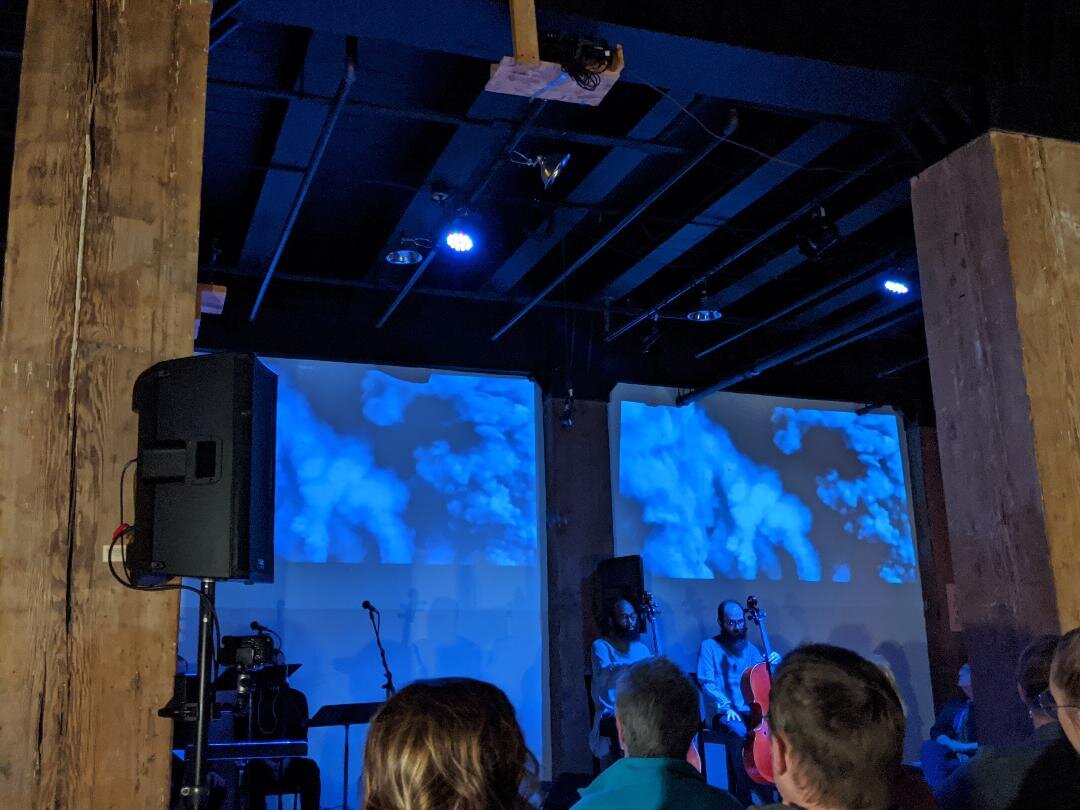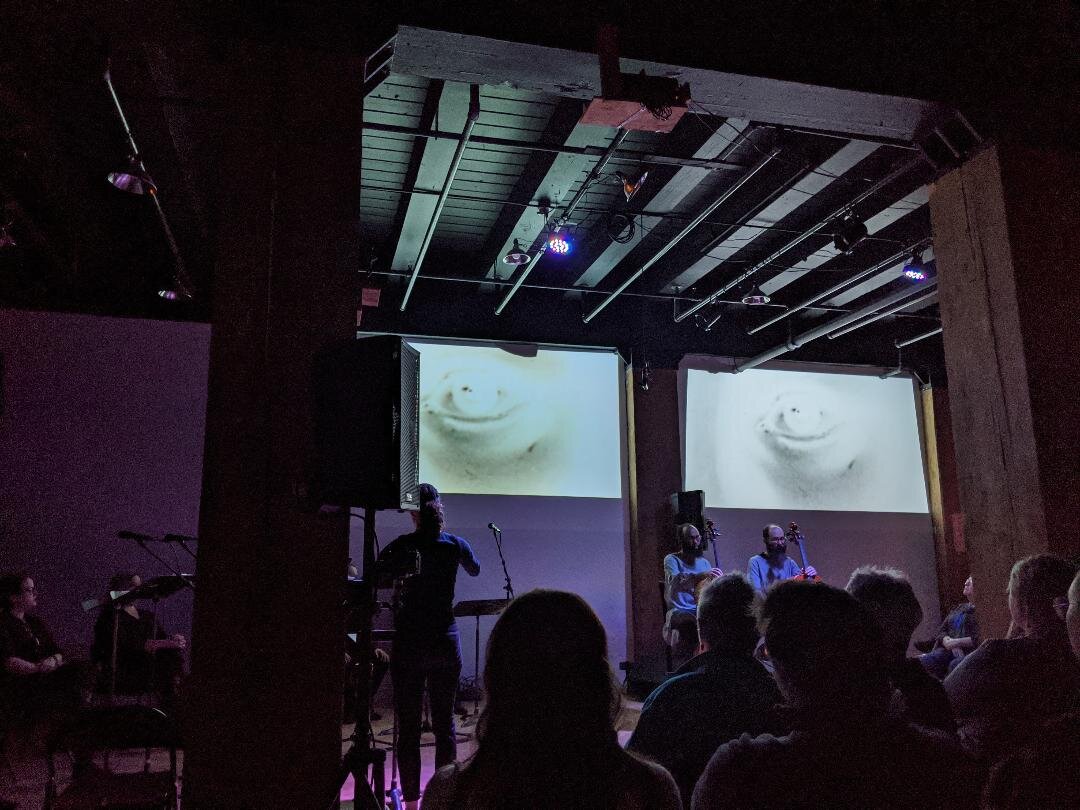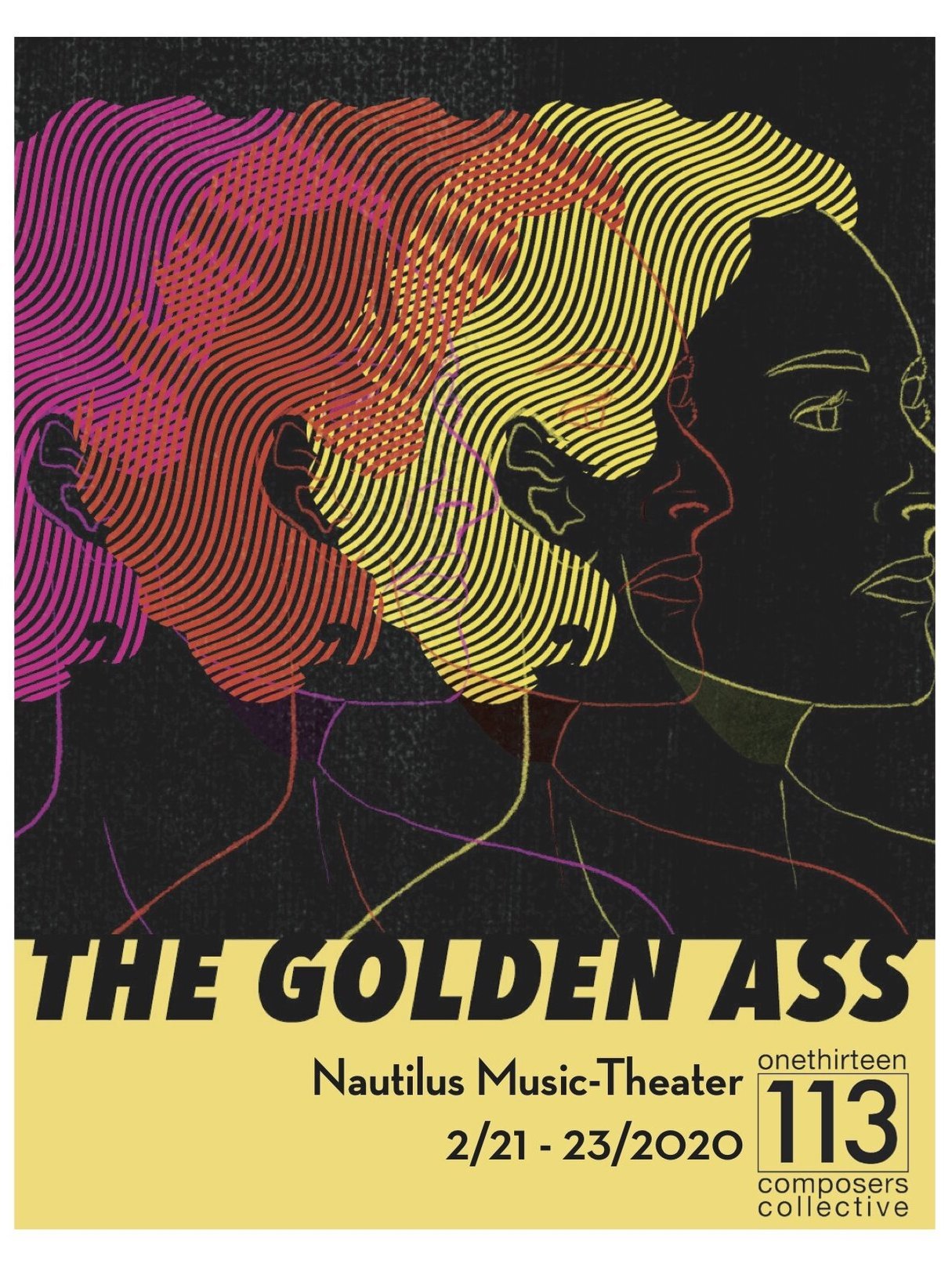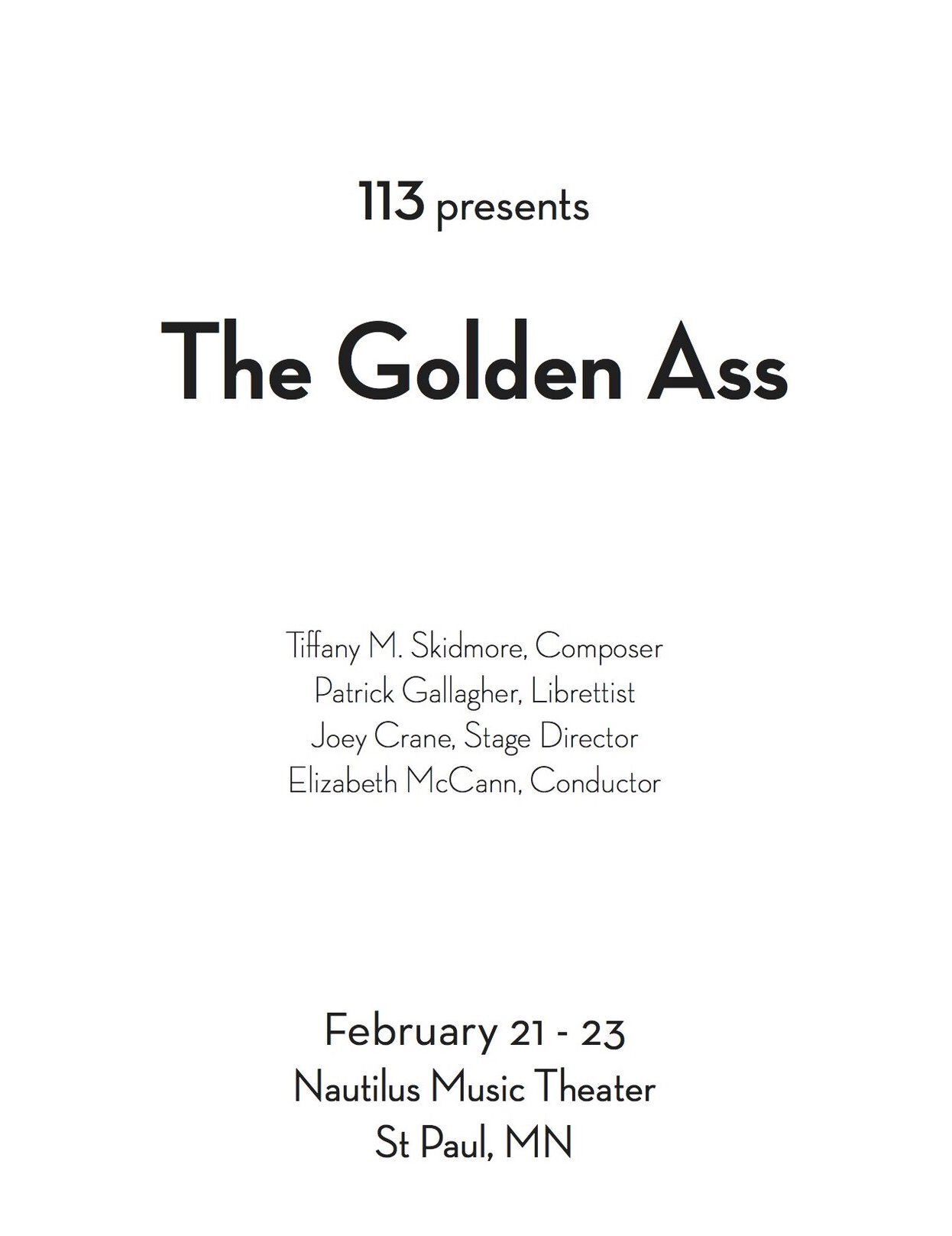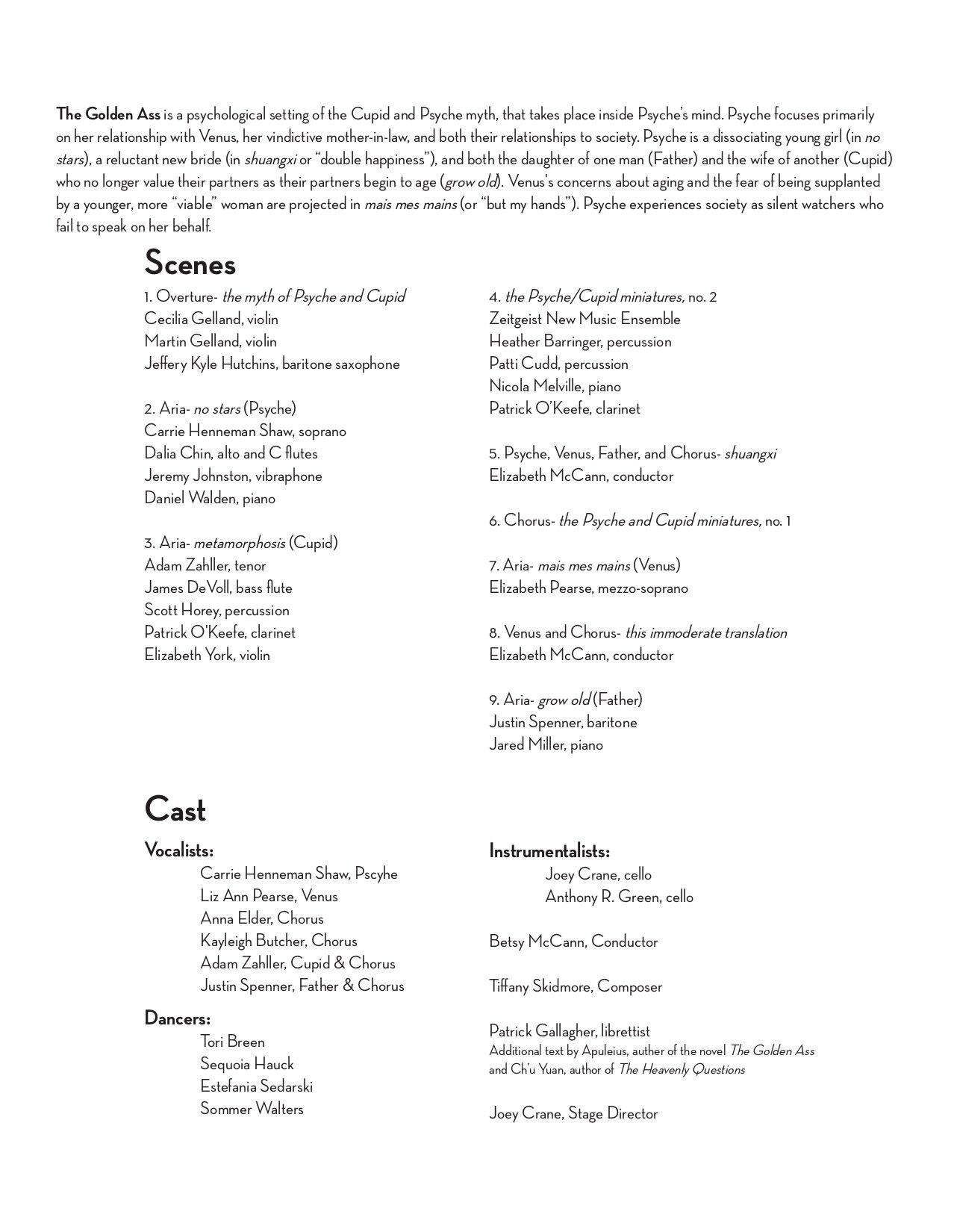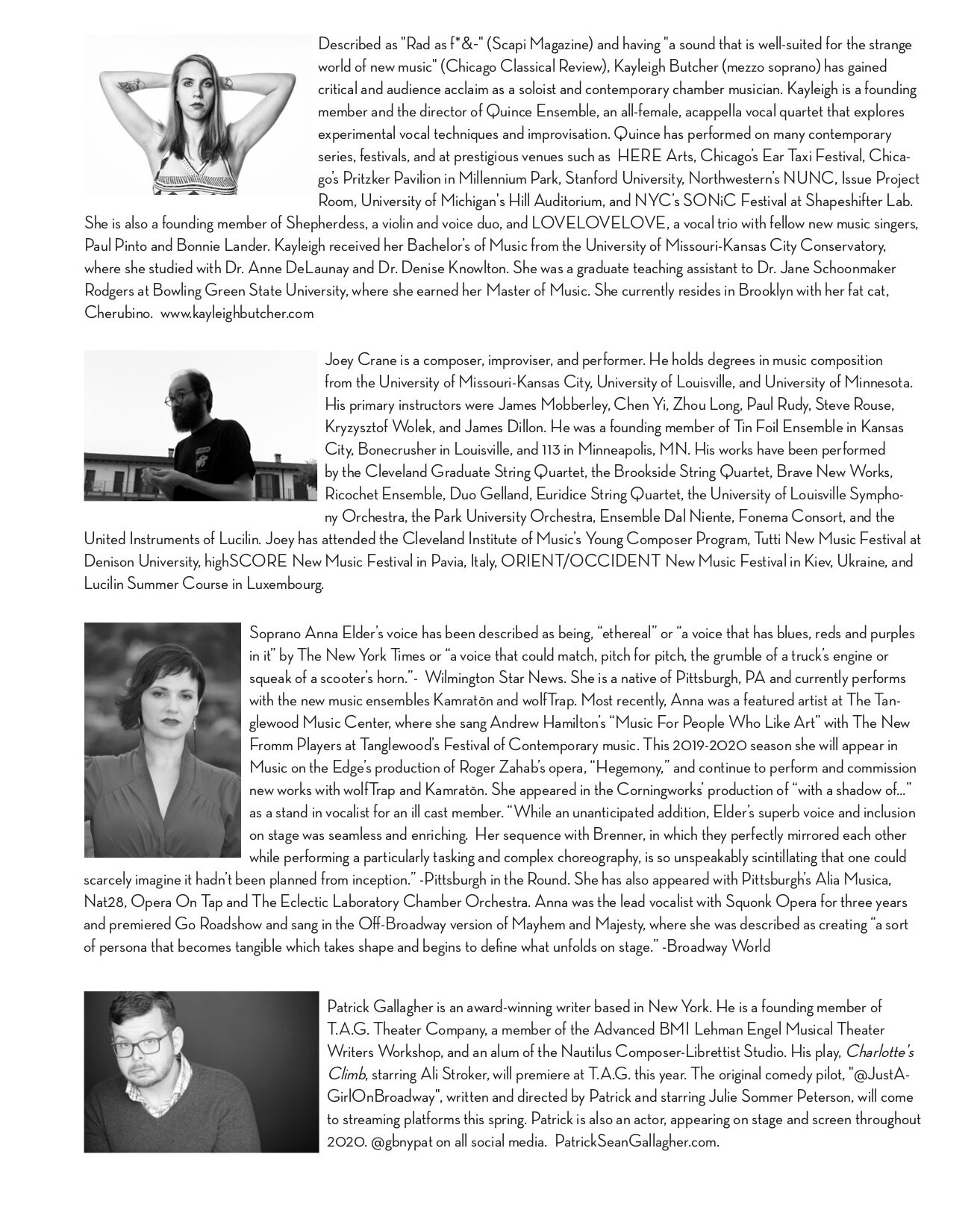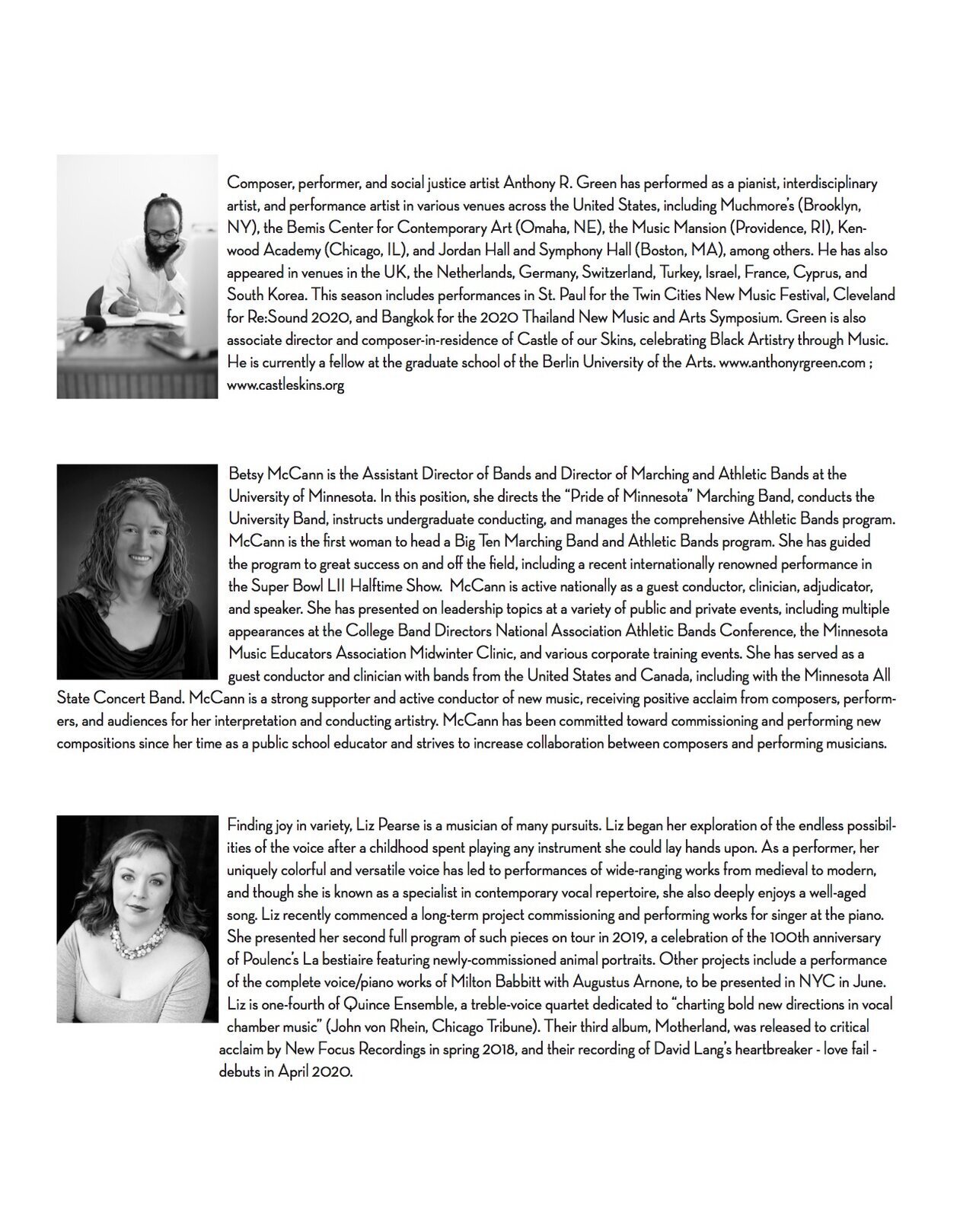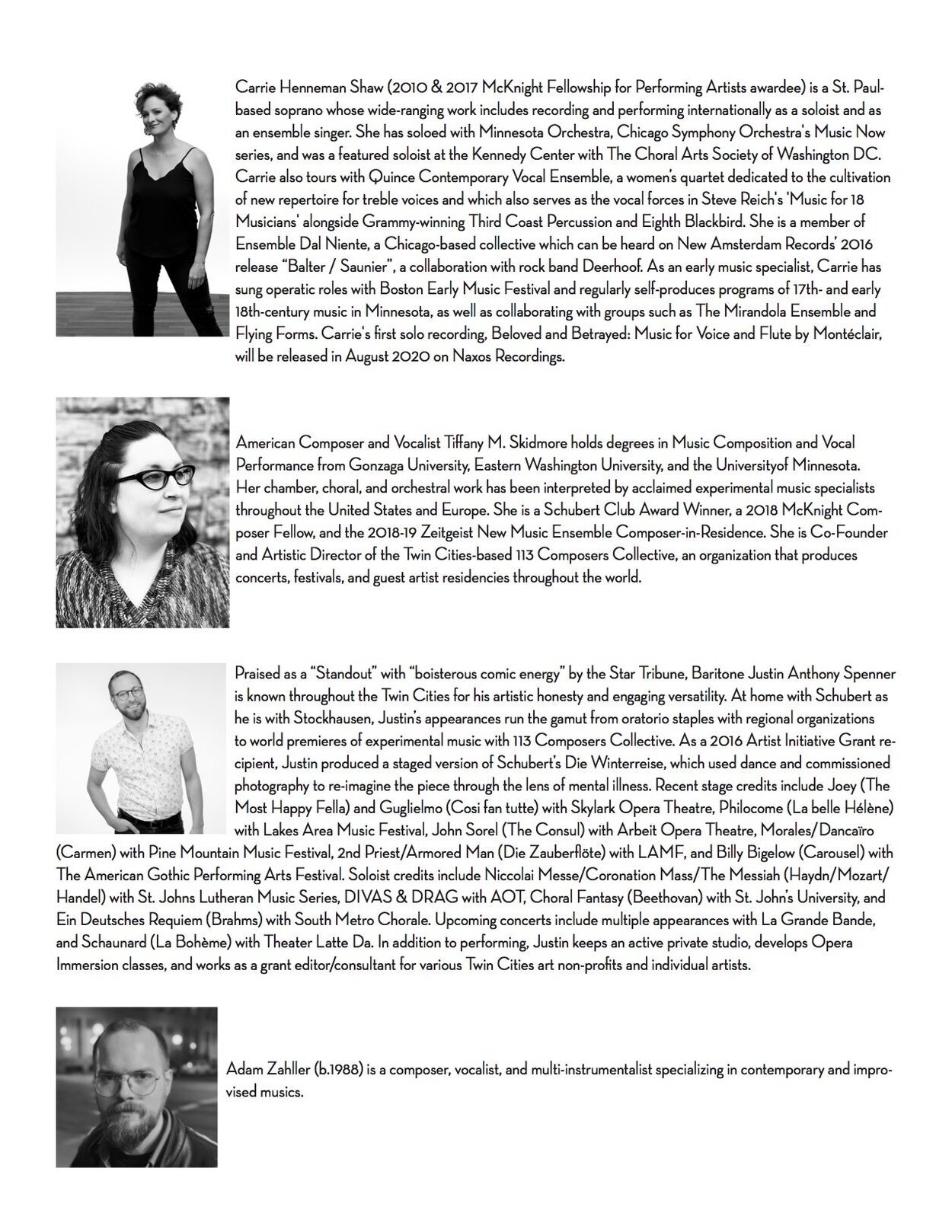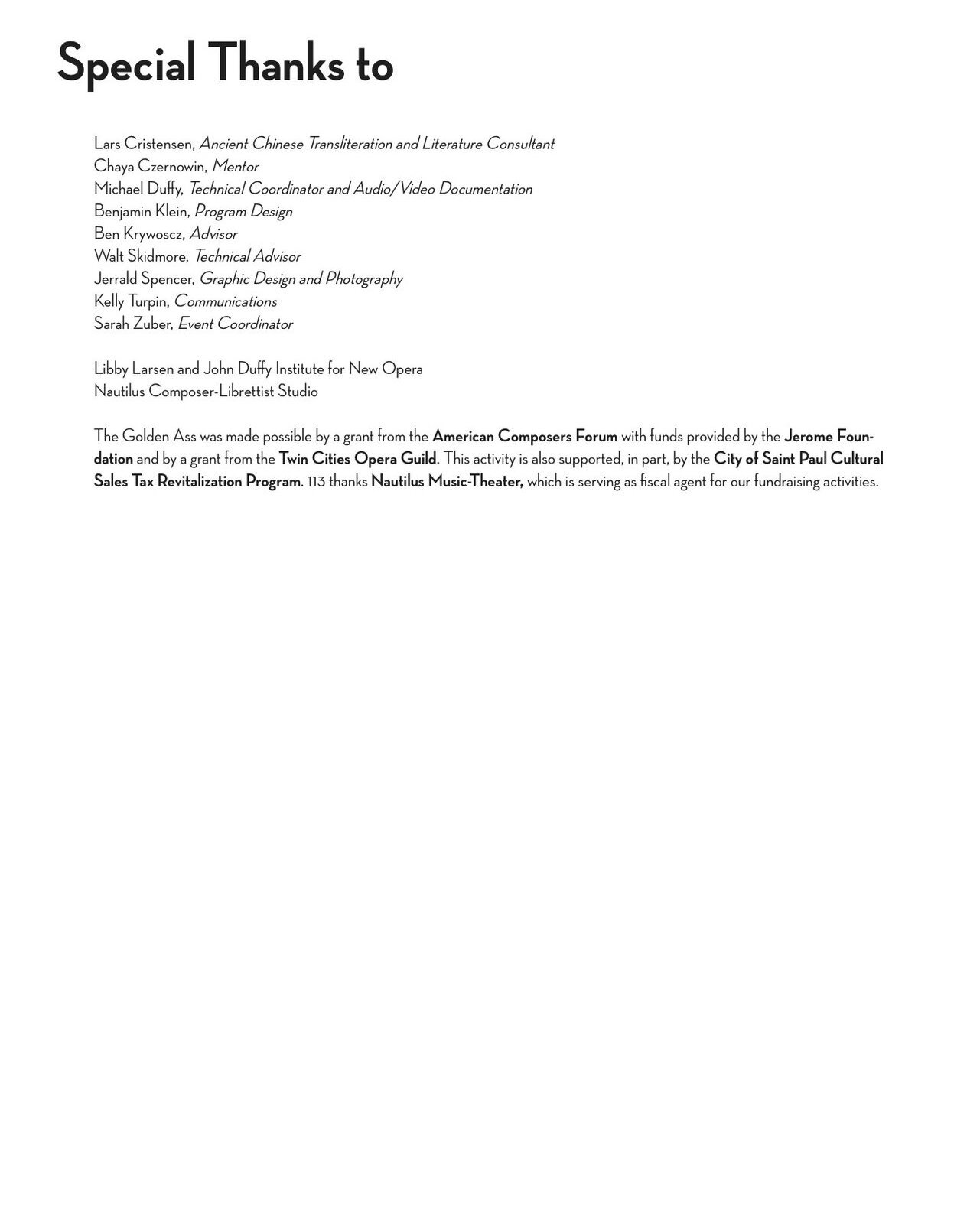the golden ass
the golden ass, a chamber opera in one act by Tiffany M. Skidmore (print)
113 Composers Collective
ISBN: 978-1-950695-37-9
the golden ass, a chamber opera in one act by Tiffany M. Skidmore (PDF)
113 Composers Collective
ISBN: 978-1-950695-37-9
2024 Production
March 13-14, 2024
Lippes Concert Hall
Buffalo, New York
Composition and Film by Tiffany M. Skidmore
Libretto by Patrick Gallagher
Adapted by Tiffany M. Skidmore
with Additional Text by
Lucius Apuleius (author of the novel, The Golden Ass)
and Ch’u Yuan (author of The Heavenly Questions)
80:00
2024 Cast
Stage Direction by Joey Crane
Dramaturgy and Stage Direction by Amanda Nelson
Movement Consultation by Dani Schofer
Technical Direction by Chris Jacobs
Piano Technician, Devin Zimmer
Production Assistance by Dantrae Alonso, Kevin Bassler, Chloe Nugent, and Jonathan Rainous
Graphic Design by Jerrald Spencer
Conducted by David Cubek
Vocalists
Nina Dante, Psyche
Tiffany Du Mouchelle, Venus
Adam Zahller, Cupid
Justin Anthony Spenner, Father/Cupid
Emily Barger, Psyche’s Sister
Julia Cordani, Featured Soprano
Christopher Castleman, Chorus
Caitlyn Faddis, Chorus
Matt Reimer, Chorus
Maria Taravella, Chorus
Rosa Vu, Chorus
Instrumentalists
Dalia Chin, flutes
Joey Crane, cello
Kyle Hutchins, saxophone
Eric Huebner, piano
Tom Kolor, percussion
Sophia Klin, violin, cello
Ciara McGuire, violin
Steve Solook, percussion
Michael Tumiel, clarinets
Synopsis
the golden ass (2017-2020) is a modern psychological dream-like setting of the Cupid/Psyche myth that focuses primarily on the relationship between Psyche and her mother-in-law Venus and both their relationships to society. Psyche allows her sister, mother-in-law, Father, and husband (Cupid) to fundamentally influence her life in ways that are ultimately destructive. Psyche and Venus exist on a continuum. At one point in her life, Venus’s life was Psyche’s life. Later in Psyche’s life, she will become Venus. Cupid and Psyche’s father exist on a similar continuum.
During her aria, no stars, it is as though Psyche is in space, so far from any star or planetary body that she sees only a black expanse. As she contemplates her life, black waves of emotion threaten to overwhelm her. Colors and scents eventually bring her consciousness back to the surface.
metamorphosis is an aria that can be sung by either Cupid or Psyche’s sister, two characters whose manipulations catalyze Psyche’s visionary transformation. During this movement, we view aspects of Psyche’s world from such a close vantage point that it is no longer possible for us to make sense of words or actions. We see only the pores of skin and individual vellus hairs.
During miniatures, no. 2, we enter into an individual cell, perhaps even an atom, the encapsulation of one small moment of Psyche’s life, to see the flurry of activity that might become visible at an even greater level of magnification–protons, neutrons, electrons–even quarks and gluons.
During shuang xi, a chorus seems to congratulate Psyche, Cupid, Venus, and the Father on their marital successes, while each character laments their individual realities. Psyche sings a Qing dynasty poem about a conflicted sexual encounter, the Father hints at the crumbling of a façade, and Venus describes an idealized placid scene that quickly becomes troubled by the undercurrent of her suffering.
In miniatures, no. 1, Psyche’s sister complains about her marriage. Venus feels betrayed by Cupid, and blames Psyche. Cupid warns Psyche not to disobey him. The Father becomes a god who condemns Psyche for her disobedience of Cupid.
In her aria, mais mes mains, Venus laments the loss of her youth and expresses deep bitterness toward Psyche, whom she sees as a kind of rival. During this immoderate translation, Psyche joins a chorus of voices who become a vehicle for the illumination of Venus’s indignation.
In grow old, the Father/Cupid sings a double-edged aria that is both coaxing and controlling.
photo credits: Irene Haupt and Kirsten Anderson
The composition of the golden ass was made possible by a grant from the American Composers Forum with funds provided by the Jerome Foundation. This production was supported by the Robert and Carol Morris Center for 21st Century Music and the Birge-Cary Chair in Music Composition.
Production Premiere
The golden ass (2017-2020) is a modern setting of the Cupid/Psyche myth that focuses primarily on the relationship between Psyche and her jealous mother-in-law, Venus, and both their relationships to society. Psyche is a dissociating young girl (in no stars), a reluctant new bride (in shuangxi or “double happiness”), and both the daughter of one man and the wife of another who no longer value their partners as their partners begin to age (grow old). Venus encapsulates her own concerns about aging and the fear of being supplanted by a younger, more “viable” woman in mais mes mains (or “but my hands”). Society watches Psyche’s life unfold—at times silently failing to speak on her behalf, while at other times, amplifying the malignant voices that surround her.
February 21-23, 2020
Nautilus Music-Theater
Saint Paul, Minnesota
View the complete production as part of the Ipse New Music Gallery
Composition and Film by Tiffany M. Skidmore
Libretto by Patrick Gallagher
Adapted by Tiffany M. Skidmore
with Additional Text by
Lucius Apuleius (author of the novel, The Golden Ass)
and Ch’u Yuan (author of The Heavenly Questions)
80:00
Original Cast
Stage Direction by Joey Crane
Technical Direction by Michael Duffy
Marketing and Promotion by Kelly Turpin
Graphic Design and Pre-Production Photography
by Jerrald Spencer
Conducted by Betsy McCann
Vocalists
Quince Vocal Ensemble
Carrie Henneman Shaw, Psyche
Liz Ann Pearse, Venus
Anna Elder, Chorus
Kayleigh Butcher, Chorus
with
Adam Zahller, Cupid/Chorus
Justin Anthony Spenner, Father/Cupid
Silent Chorus
Tori Breen, Movement
Sequoia Hauck, Movement
Estefania Sedarski, Movement
Sommer Walters, Movement
Anthony R Green, Cello
Joey Crane, Cello
Instrumentalists
Duo Gelland
Cecilia Gelland, violin
Martin Gelland, violin
Zeitgeist New Music Ensemble
Patrick O’Keefe, clarinets
Heather Barringer, vibraphone
Patti Cudd, percussion
Nicola Melville, piano
Dalia Chin, alto and C flutes
James DeVoll, bass flute
Jeffery Kyle Hutchins, saxophone
Elizabeth York, violin
Jeremy Johnston, vibraphone
Scotty Horey, percussion
Jared Miller, piano
Daniel Walden, piano
I. the myth of Psyche and Cupid
6:00- overture for violin duo with baritone saxophone
premiere by Duo Gelland and Jeffery Kyle Hutchins at Darmstädter Ferienkurse (07/2018)
II. no stars
13:00- aria for soprano (Psyche), C flute, alto flute, vibraphone, and piano
aria premiere by Fonema Consort at Ted Mann Concert Hall (02/2017)
Nina Dante (soprano), Dalia Chin (flutes), Daniel Walden (piano), and Ryan Packard (vibraphone),
and David Cubek (conductor)
John Duffy Institute for New Opera workshop performance at the Virginia Arts Festival (03/2017)
Nina Dante (soprano), Wayla Chambo (alto and C flutes), Reid Stockdill (vibraphone), Amanda Halstead (piano),
and Alan Johnson (conductor)
Nautilus Music-Theater production (02/2020)
Carrie Henneman Shaw, Dalia Chin, Daniel Walden, and Jeremy Johnston
III. the metamorphosis
13:00- aria for soprano or tenor (Sister or Cupid), bass flute, clarinet, violin, and percussion
aria premiere by the TAK Ensemble at Studio Z (02/2019)
Charlotte Mundy (soprano), Laura Cocks (bass flute), Carlos Cordeiro (clarinet), Marina Kifferstein (violin),
and Ellery Trafford (percussion)
Nautilus Music-Theater production (02/2020)
Adam Zahller, James DeVoll, Patrick O’Keefe, Elizabeth York, and Scotty Horey
IV. the Psyche/Cupid miniatures, no. 2
1:00- interlude for bass clarinet, vibraphone, percussion, and piano
premiere by the Zeitgeist New Music Ensemble at Studio Z (09/2019)
Patrick O’Keefe (bass clarinet), Heather Barringer (vibraphone), Patti Cudd (percussion), and Nicola Melville (piano)
V. shuangxi
7:30- for Psyche, Venus, and Father with SSAATB chorus
John Duffy Institute for New Opera workshop performance (03/2017)
soprano Nina Dante (Psyche), Ashley Fabian (mezzo-soprano), Simon Barrad (baritone), Reilly Nelson (soprano),
Amber Fasquelle (mezzo-soprano), Thomas J. Capobianco (tenor), and Alan Johnson (conductor)
chorus premiere by the Gregorian Singers with Artemis Vocal Ensemble at Lakewood Cemetery Chapel (05/2017)
featuring soloists Bethany Battafarano (soprano), Alia Jeraj (mezzo soprano), Justin Anthony Spenner (baritone),
and Monte Mason (conductor)
Nautilus Music-Theater production (02/2020)
Quince Vocal Ensemble with Justin Anthony Spenner, Adam Zahller, and Betsy McCann
VI. the Psyche/Cupid miniatures, no. 1
0:18- chorus for 4 voices
premiere by the Zeitgeist New Music Ensemble (09/2019)
Nautilus Music-Theater production (02/2020)
Quince Vocal Ensemble with Justin Anthony Spenner and Adam Zahller
VII. mais mes mains
12:00- aria for solo mezzo soprano (Venus)
aria premiere by Nina Dante at the Twin Cities New Music Festival (10/2018)
Nautilus Music-Theater production (02/2020)
Liz Ann Pearse
VIII. this immoderate translation
6:00- chorus for Venus with SSAAB voices
chorus premiere by Artemis Vocal Ensemble featuring Alyssa Anderson as Venus (05/2018)
Nautilus Music-Theater production (02/2020)
Quince Vocal Ensemble with Justin Anthony Spenner, Betsy McCann (conductor), and Liz Ann Pearse as Venus
IX. grow old
9:00- aria for solo baritone (Father) with piano and chainmaille
aria premiere by Justin Anthony Spenner and Nanyi Qiang at the Twin Cities New Music Festival (02/2018)
Nautilus Music-Theater production (02/2020)
Justin Anthony Spenner and Jared Miller
writings about the golden ass
Interview with Tiffany Skidmore by Nina Dante
November 1, 2018
”I’m struck by the qualities that unite these works: the slow-moving textures, the glacial tempi, the galactic solemnity, the heavy emotions felt at a distance. I can’t help but think of Sciarrino’s description of his music: like watching a volcano erupt from a distance; but in your case, perhaps like watching a star explode through a telescope.”
Interview with Tiffany Skidmore by Tyler Schultz
September 9, 2019
”The miniatures zoom in on certain characteristic sounds from the opera and re-contextualize, re-imagine, and expand upon those sounds.”
The Golden Ass Debut and What to Expect by Lise Spragg
September 20, 2019
”The focus becomes the psychology of the events and their impacts on Psyche…a timeless archetype.”
Myth-busting composers will change the way you look at opera by Terry Blain
February 19, 2020
”’The Golden Ass’…[is] aiming to create a more visceral impression that provokes thought well after the final note has sounded.”
Behind the Scenes by Lise Spragg
February 21, 2020
“This Psyche is way more truly ethereal - speaking in all the languages of the world, alternately floating in timelessness and striking with sudden violence.”
—Carrie Henneman Shaw
The Golden Ass, Perplexing on the Surface, But Profoundly Confusing Underneath by Rob Dunkelberger
February 22, 2020
“If you are curious, if you like avant-garde, if you enjoy unusual music, you may find this challenging but enjoyable as well.”
The composition of the golden ass was made possible by a grant from the American Composers Forum with funds provided by the Jerome Foundation. This production was made possible by a grant from the Twin Cities Opera Guild. This activity was also supported, in part, by the City of Saint Paul Cultural Sales Tax Revitalization Program. 113 would also like to thank Nautilus Music-Theater, which served as fiscal agent for fundraising activities related to this production.

